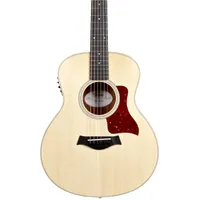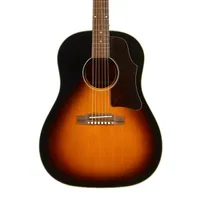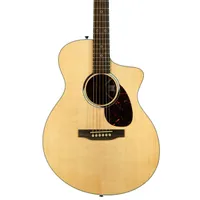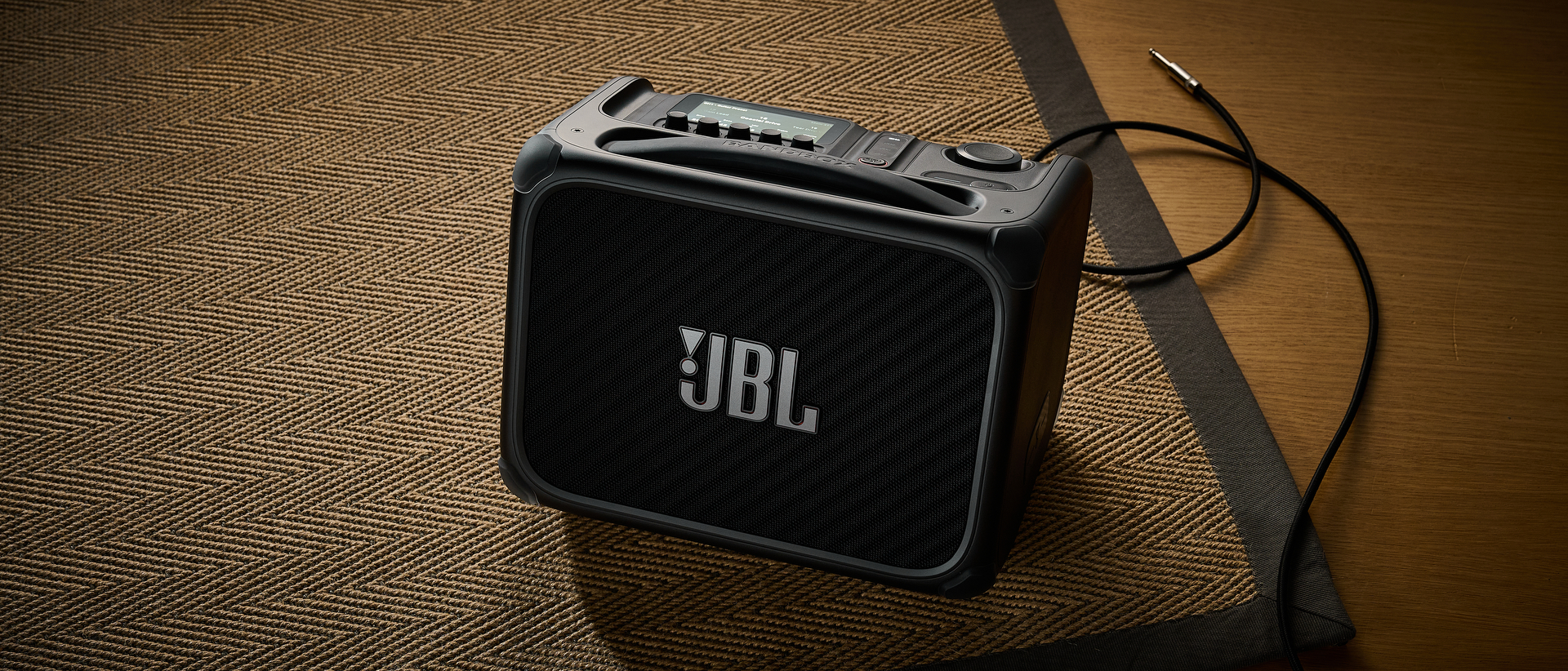Best acoustic guitars 2026: 10 top options for guitarists of all ages and abilities
Guitar World’s pick of the best acoustic guitars from Fender, Gibson, Martin, Taylor, Epiphone and more – reviewed and demoed by experts
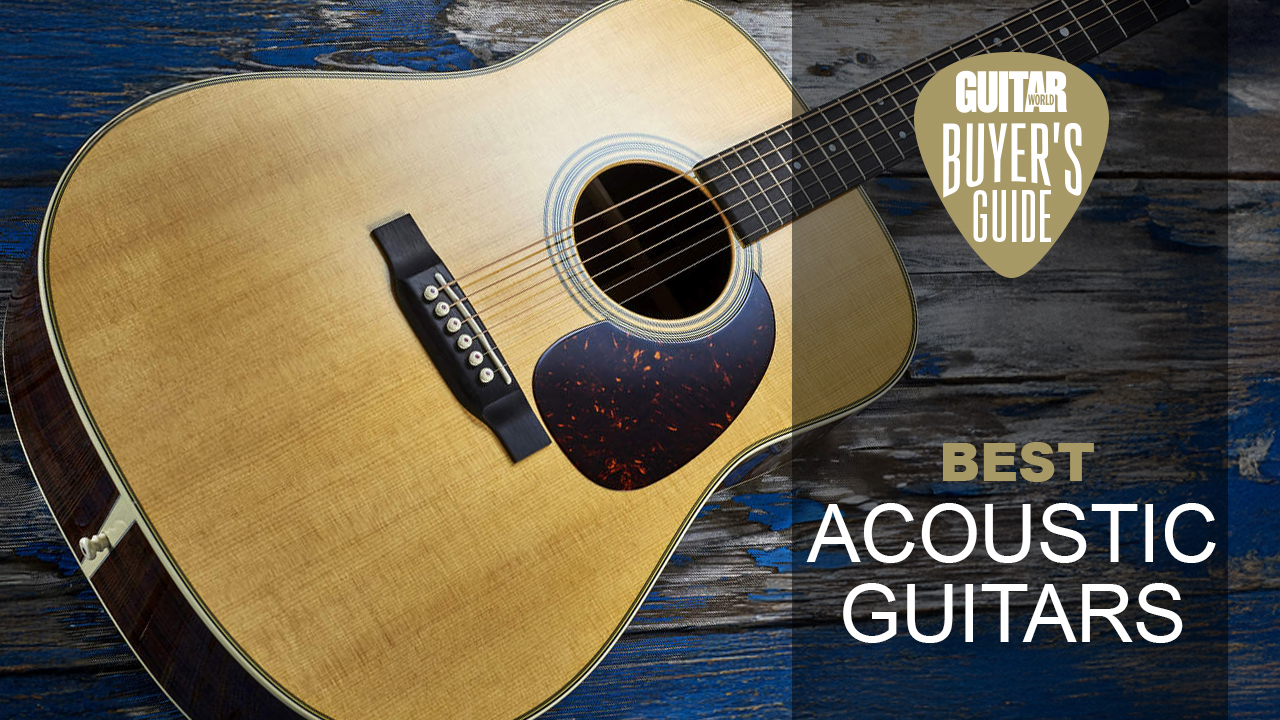
All the latest guitar news, interviews, lessons, reviews, deals and more, direct to your inbox!
You are now subscribed
Your newsletter sign-up was successful
It may sound bold, but I genuinely believe there's never been a better time to buy an acoustic guitar. The sheer volume of guitars on the market at the moment is exhilarating, with many companies producing their best acoustic guitars ever. Now, with so many instruments from an incredibly diverse group of manufacturers, it's easy to get overwhelmed. I call it 'option paralysis,' but don't worry, I’m here to help.
With entry-level acoustics from the likes of Fender and Yamaha to high-end heavyweights from Gibson, Taylor, and Martin, I’ve made sure to cover a wide range of instruments.
To ensure you’re making an informed decision, I’ve included a playing demo of every guitar in this guide. For the videos, I played the same chord progression at various dynamic levels so you can compare the instruments sonically. You’ll also find detailed write-ups covering the ins and outs of each guitar, as well as full reviews that go into even greater detail. When purchasing an acoustic guitar, it's essential to consider factors such as sound quality, body shape, wood type, playability, and price. If you're unsure where to start, I highly recommend testing different models to find the best fit for your style.
Currently, my top pick is the king of the dreadnoughts, the Martin D-28. This is one of the most popular acoustic guitars of all time, and for good reason. With cannon-like projection and a warm and full tone, you’ll be hard-pressed to find a better all-rounder acoustic. Looking for something a little cheaper? You can’t go wrong with the budget-friendly Yamaha FG-800. This affordable dreadnought produces an even tone that surpasses some pricier guitars.
Need more advice? I’ve answered all the most frequently asked questions surrounding the purchase of an acoustic guitar, including the ones I was most often asked when I worked in the shop. Better yet, Guitar World’s clever price widgets have scoured the web to find the best prices at trusted retailers, saving you any legwork in that department, too. Complete novice? Well, check out our guide to the best acoustic guitars for beginners.

"I’m a former music retail manager turned professional guitar writer, and I'm here to guide you through the process of finding your next acoustic guitar. So, whatever your budget or playing style, I guarantee one of these models will be the best acoustic guitar for you."
How I tested: Each guitar was thoroughly tested by either me or another member of the Guitar World team, paying careful attention to everything from build quality and tone to playing action, finishing, and lastly, value. Read more on how we tested the products for this guide.
The quick list
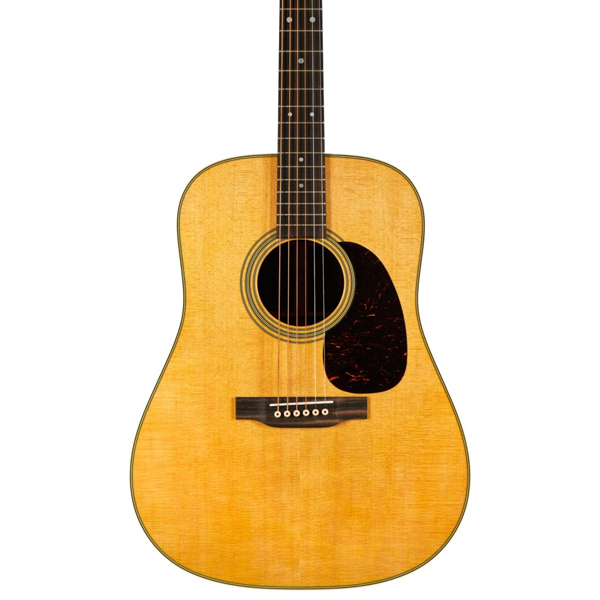
The Martin D-28 is to acoustic guitars what the Porsche 911 is to cars. When you first start learning, it's the guitar you dream of owning. As you get better, you begin to appreciate what makes it so unique. And, if you ever get to try one, you'll understand what all the fuss is about.
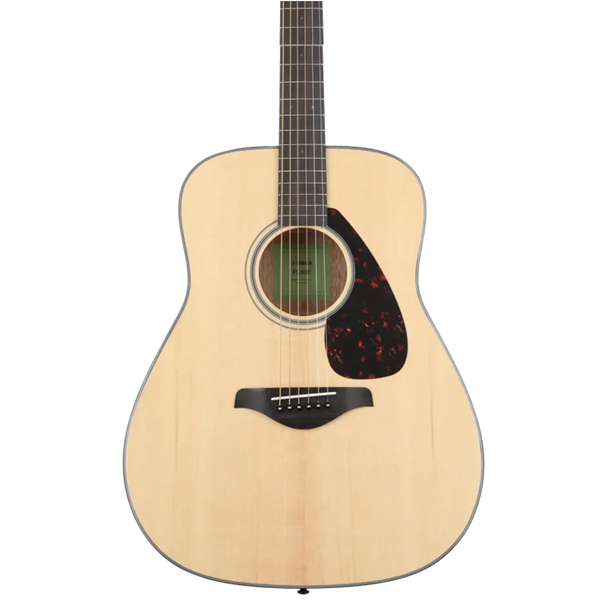
For me, the Yamaha FG800 is probably one of the best budget acoustic guitars of all time. The FG series of guitars has a rich history that dates back to 1966 when the first instrument was introduced.
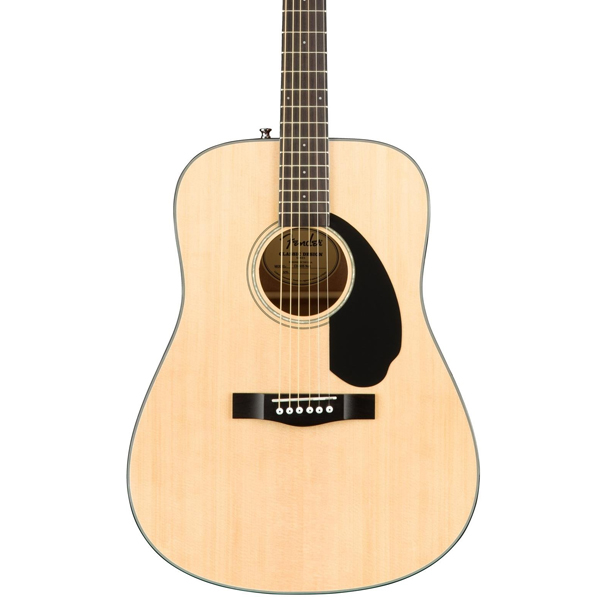
When it comes to finding a great starter instrument, I always recommend the Fender CD-60S. In my opinion, this affordable guitar truly has it all. It is well-made, easy to play, and sounds superb!
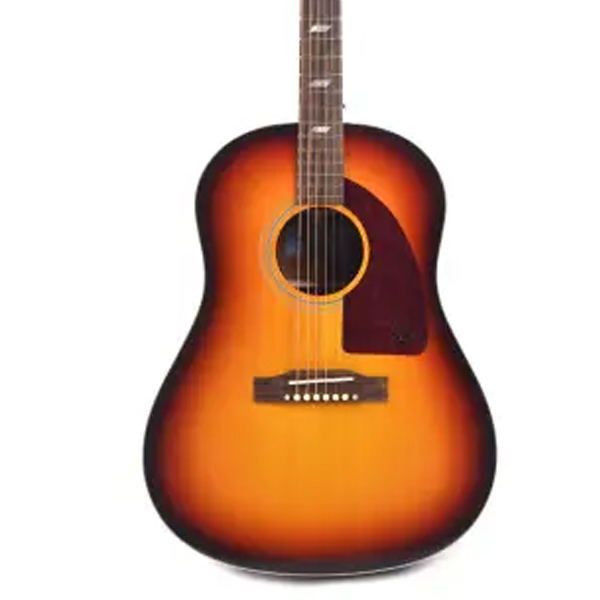
One of the unsung heroes of the Epiphone stable of acoustics, the Masterbilt Texan is an exceptional value acoustic guitar that provides incredible sound quality and versatility for its price.
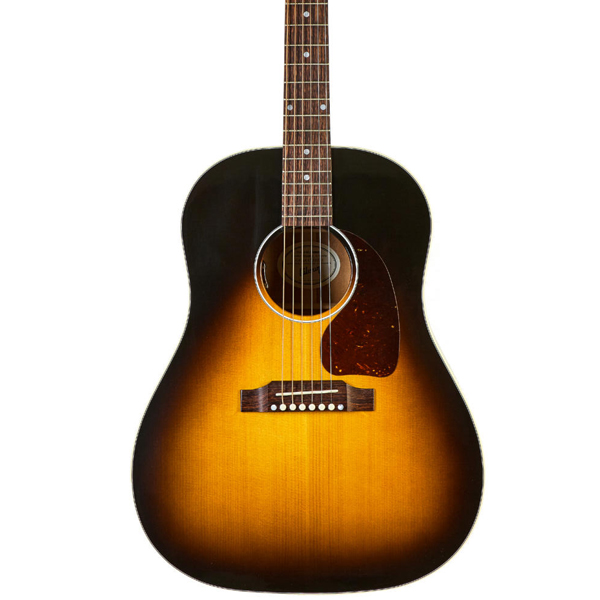
The J-45 has been spotted slung around the shoulders of many notable players, new and old, through the years, from Bob Dylan to Billie Joe Armstrong, Woody Guthrie, and Myles Kennedy.
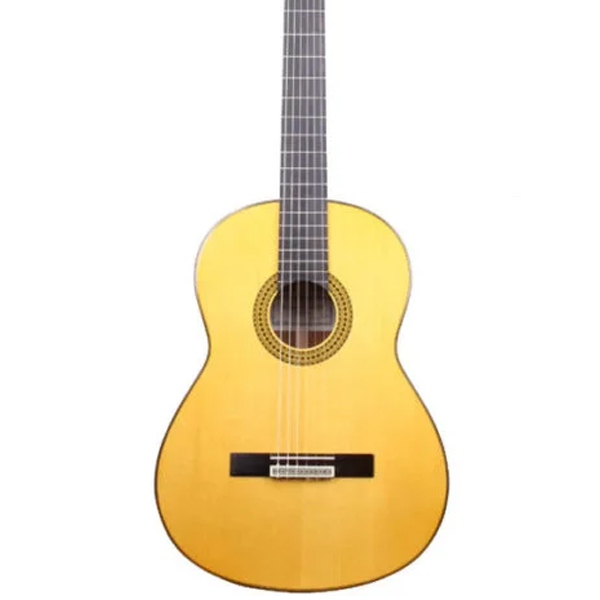
Sitting at the top of Yamaha’s highly popular CG series, the CG192C is a wonderfully playable, mid-priced classical guitar. True to Yamaha’s reputation, it embodies the brand’s core qualities: durability, great value for money, and a pleasing tone.
Load the next 4 products ↓
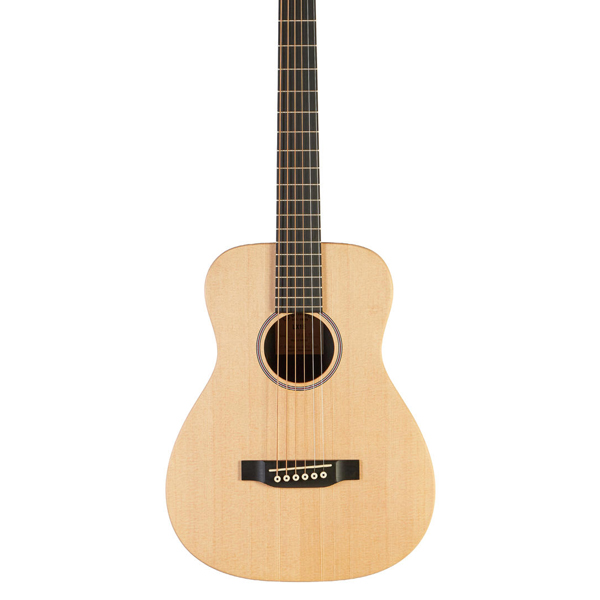
For me, the Martin LX1E redefines what a small-sized dreadnought can achieve. While initially marketed as a travel acoustic guitar, easily packed into the included gig bag for convenience, it quickly becomes clear that this instrument is destined for much more than just travel.
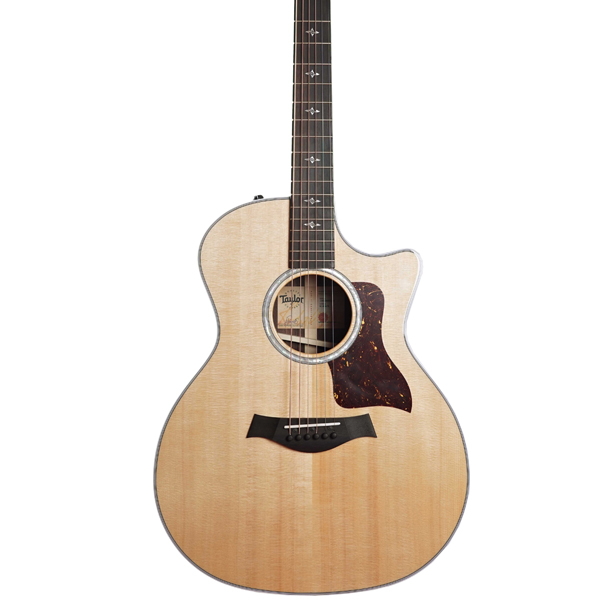
Bob Taylor may not have realized the impact of launching the Grand Auditorium body shape in 1994, but it quickly became Taylor’s most popular design and remains a top choice today – and is my top choice for those seeking a world-class electro acoustic guitar.
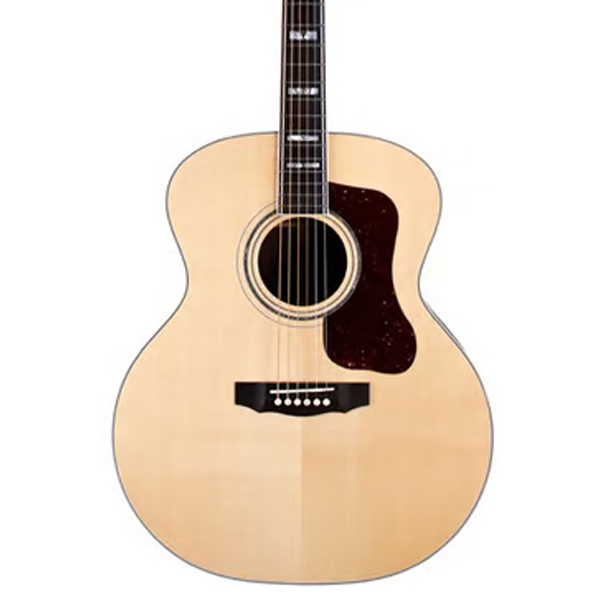
Next up, I have chosen something a bit special. Something from the extremes of acoustic guitar excellence. The gorgeous Guild F-55E. I am a massive fan of this ginormous guitar. The F-55E is, in our experience, a tonal behemoth, a fine example of how good a jumbo guitar can sound when it’s done correctly.
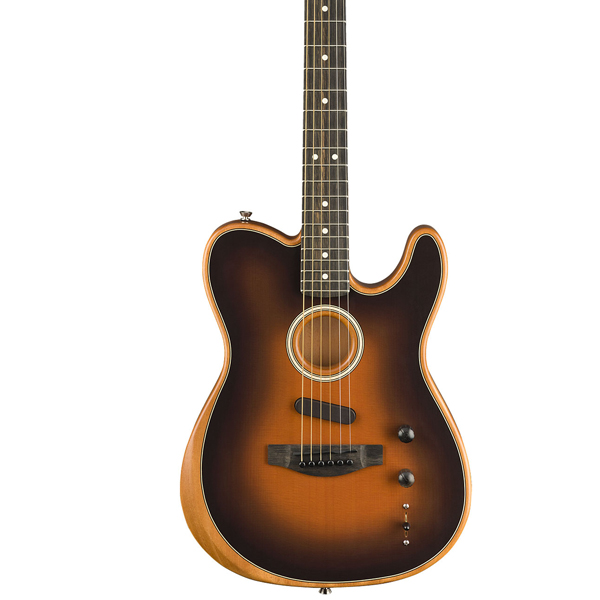
Okay, so the Fender Acoustasonic is a pretty tricky instrument to define. Is it an electric or is it an acoustic? Well, really, it’s both, and that’s why I’m confident enough to include it in my guide to the best acoustic guitars.
Best overall
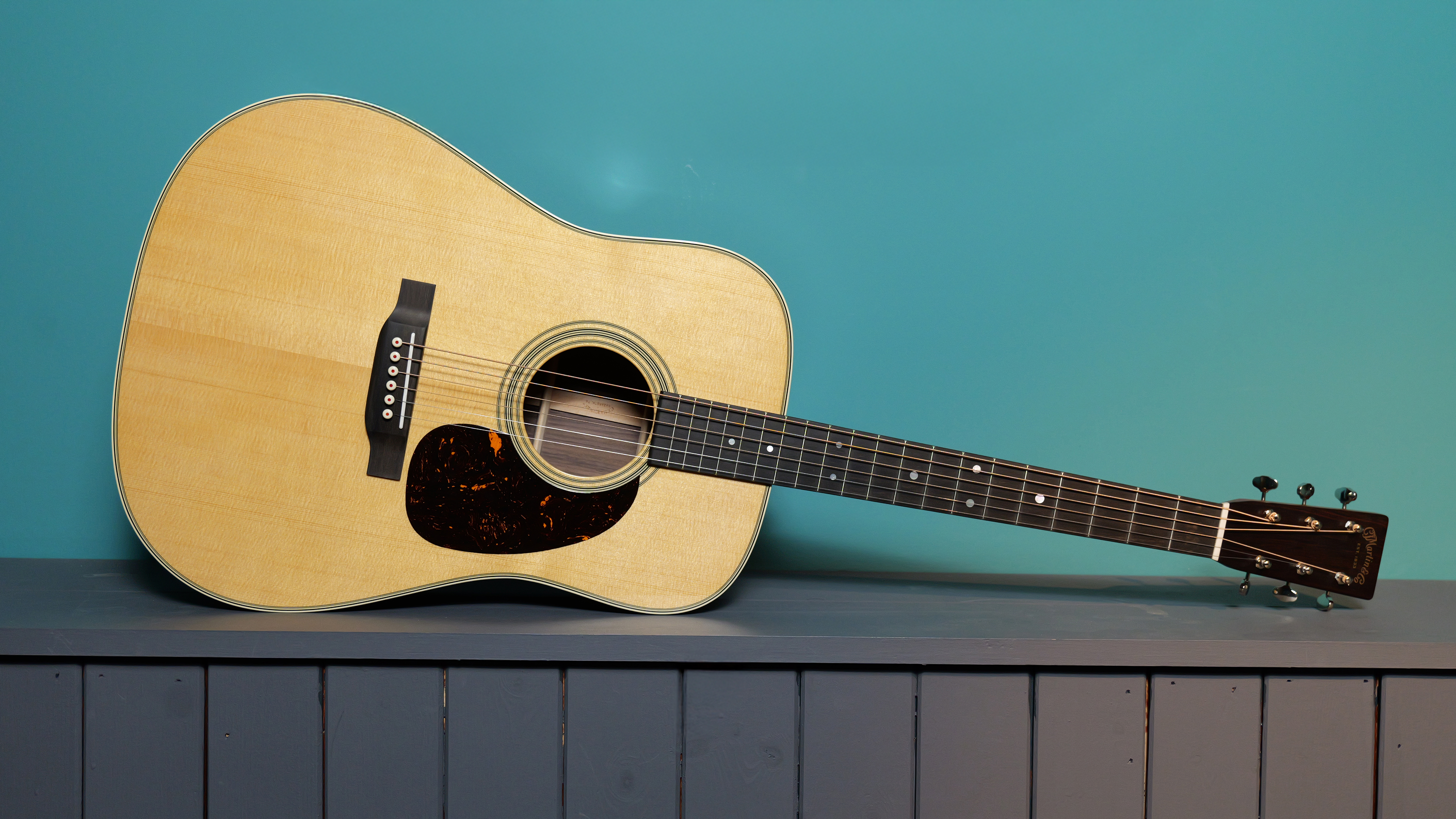
Specifications
Reasons to buy
Reasons to avoid
Professional guitar players or musicians who are serious about great acoustic tones.
✅ Buy if you’re seeking the gold-standard dreadnought: In my opinion, this is the greatest dreadnought ever made.
❌ Avoid if you don’t like big guitars: This isn’t the largest acoustic guitar on this list, but it is still pretty sizable. Smaller players may want to try the OM or 000 variant.
Value: ★★★★☆
Playability: ★★★★★
Sound: ★★★★★
Overall: ★★★★★
In a nutshell: The Martin D-28 is to acoustic guitars what the Porsche 911 is to cars. When you first start learning, it's the guitar you dream of owning. As you get better, you begin to appreciate what makes it so unique. And, if you ever get to try one, you'll understand what all the fuss is about.
Famed for its favor among some of music's best-known names, the D-28 has cemented its place in music history over eight decades. During our testing, we discovered that its rich, warm tones can be employed across any number of musical genres, and the build quality is about as good as it gets.
Build: In our glowing review, we were struck with just how well put together this model was, saying, “Examining the guitar in detail, I’m absolutely stunned by the attention to detail and overall build quality. A close examination reveals not a single thing out of place and despite its initially plain look in the case, the many tiny flourishes like the antique white binding and multi-stripe rosette are deftly applied.”
Performance: The D-28 works equally well for strumming and fingerstyle and sits in the mix perfectly, thanks to its balanced low end. Players of any standard and any style should try the D-28 at least once in their lives. When you know, you know.

“There’s a reason the Martin D-28 continually tops lists of the most famous acoustic guitars. It sounds incredible, is brilliantly put together, and delivers an inspiring playing experience.”
Read my full Martin D-28 review
Best on a budget
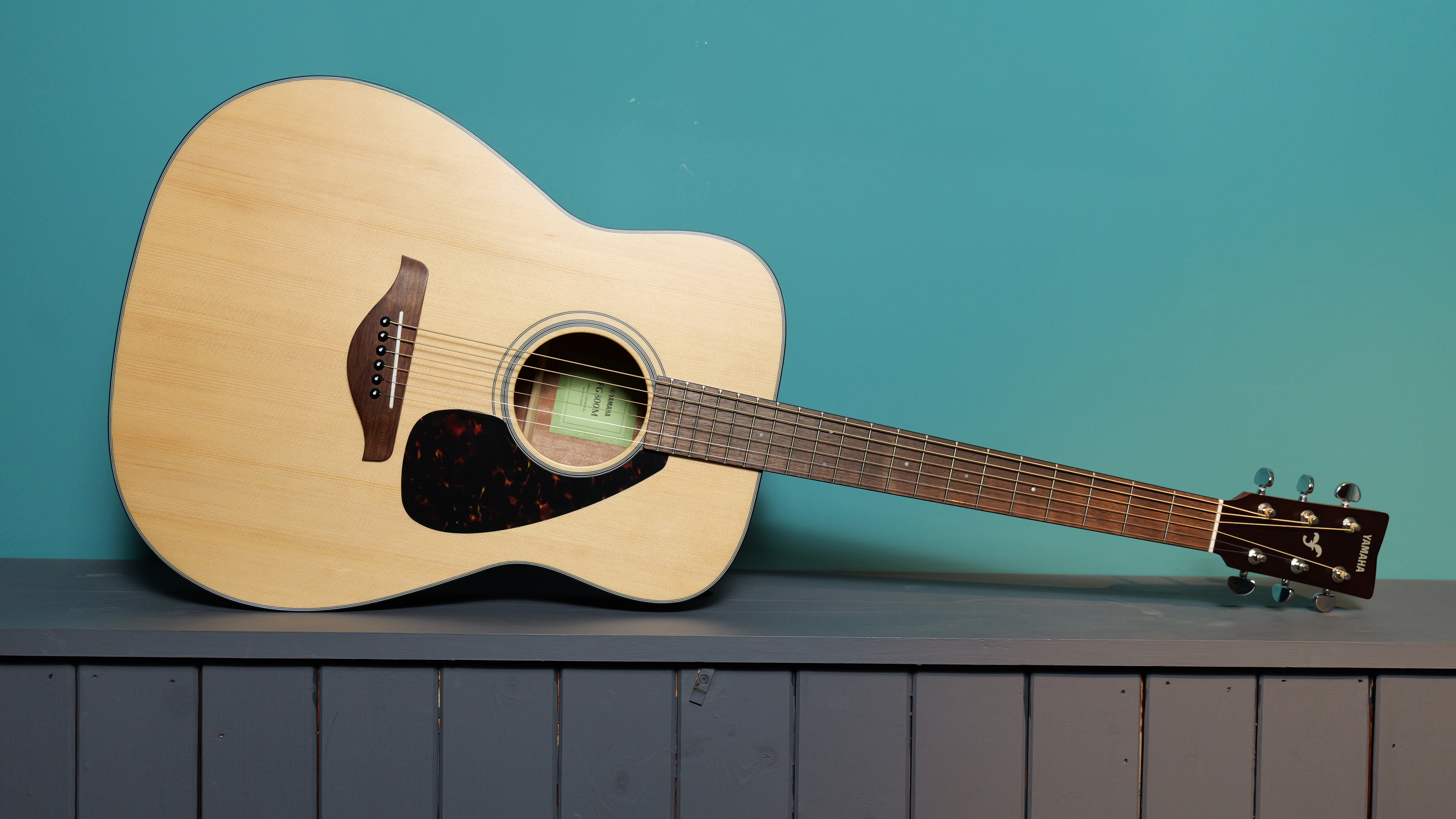
Specifications
Reasons to buy
Reasons to avoid
This is the perfect model for players looking for great tone on a budget.
✅ Buy if you’re seeking superb build quality: For us, Yamaha offers the best build quality at this price point. Their guitars are impeccably finished and well-made.
❌ Avoid if you need onboard electronics: Unfortunately, this model does not come loaded with a preamp or pickup.
Value: ★★★★★
Playability: ★★★★☆
Sound: ★★★★★
Overall: ★★★★½
In a nutshell: For me, the Yamaha FG800 is probably one of the best budget acoustic guitars of all time. The FG series of guitars has a rich history that dates back to 1966 when the first version was introduced. Over the decades, these guitars have built a stellar reputation, consistently making it onto 'best of' lists. This longevity speaks volumes about the craftsmanship, durability, and overall musicality of these instruments. Whether you're a new or experienced player, Yamaha has managed to create a guitar that caters to a wide range of musicians without breaking the bank.
Build: In my opinion, a solid spruce top at this price point is frankly astounding. Solid woods inherently offer better resonance, and the tonal depth and projection that come from a solid spruce top are difficult to find within this budget range. I’m more accustomed to all-laminate guitars at this price, which often don’t provide the same level of tonal richness. The back and sides of the Yamaha FG800 are typically made from a sturdy tonewood, which complements the solid top beautifully. As you can hear from the video below, the solid top construction lends this guitar a powerful voice that, combined with the dreadnought body shape, allows it to produce serious volume. The dreadnought design not only enhances projection but also contributes to a well-balanced sound with a rich and warm tonality, making it suitable for fingerpicking as well as strumming.
Performance: A smooth, well-finished neck with an excellent round profile encourages many playing styles, whether you prefer flatpicking, fingerstyle, or just casual strumming. The neck is designed to provide a comfortable grip, which is especially beneficial for long practice sessions or gigs. It's hefty enough for experienced players to enjoy without sacrificing playability, but it’s also designed to be intuitive for the less seasoned strummer to easily pick up their first chords. The action is often set just right for a blend of ease and control, making transitions between chords seamless.
Overall, the Yamaha FG800 is a genuinely great acoustic guitar that over-delivers for the money, bringing both quality and affordability to the table. Its versatility makes it a top choice for a variety of musical styles and skill levels.
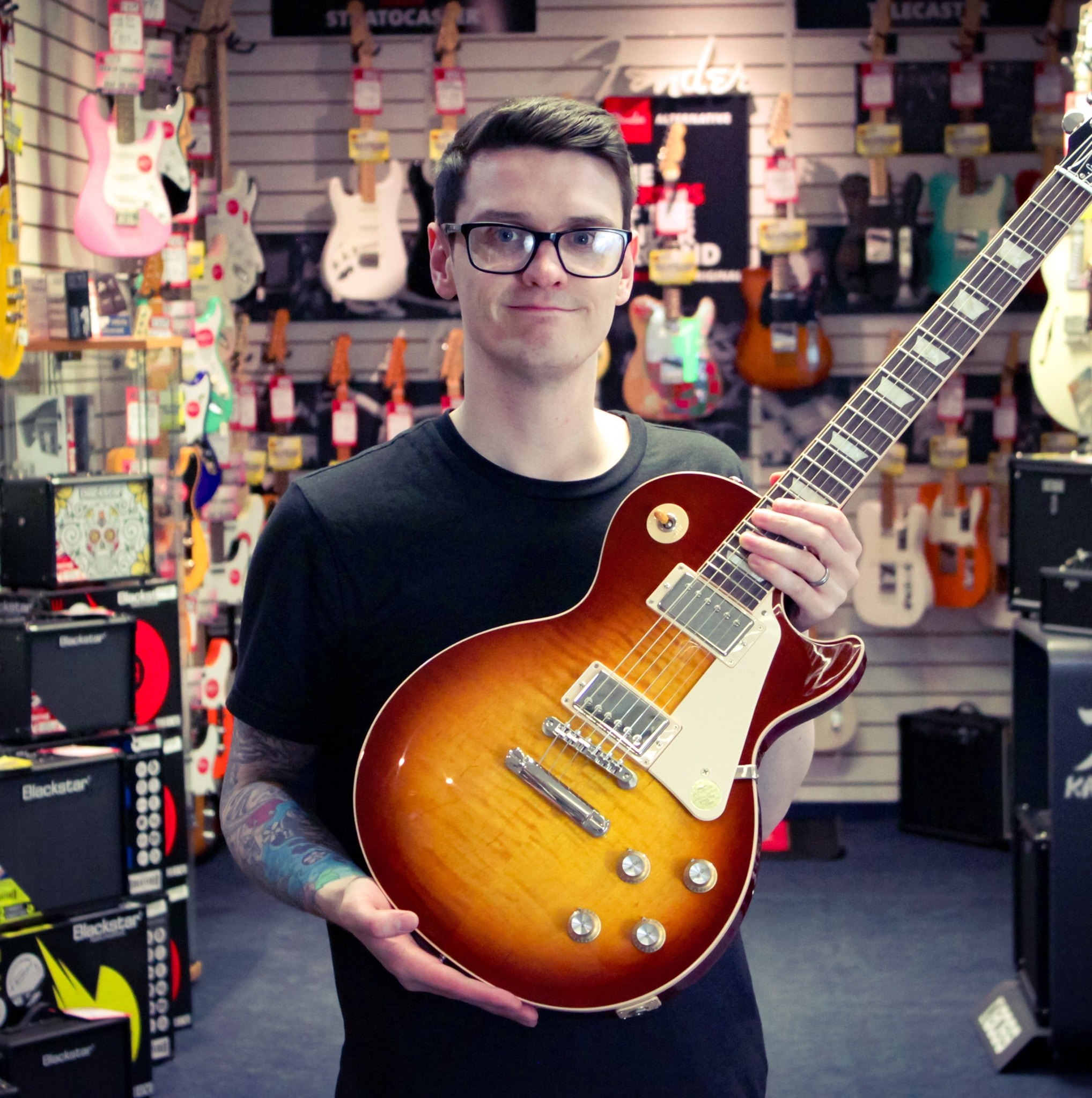
“There’s no doubt about it, the Yamaha FG800 is one of the greatest budget acoustics of all time. Its solid top helps deliver a rich, full-bodied tone usually reserved for more expensive instruments. In addition, the smooth neck is comfortable, extremely playable, and perfect for players at the beginning of their musical journey.”
Read my full Yamaha FG800 review
Best for beginners
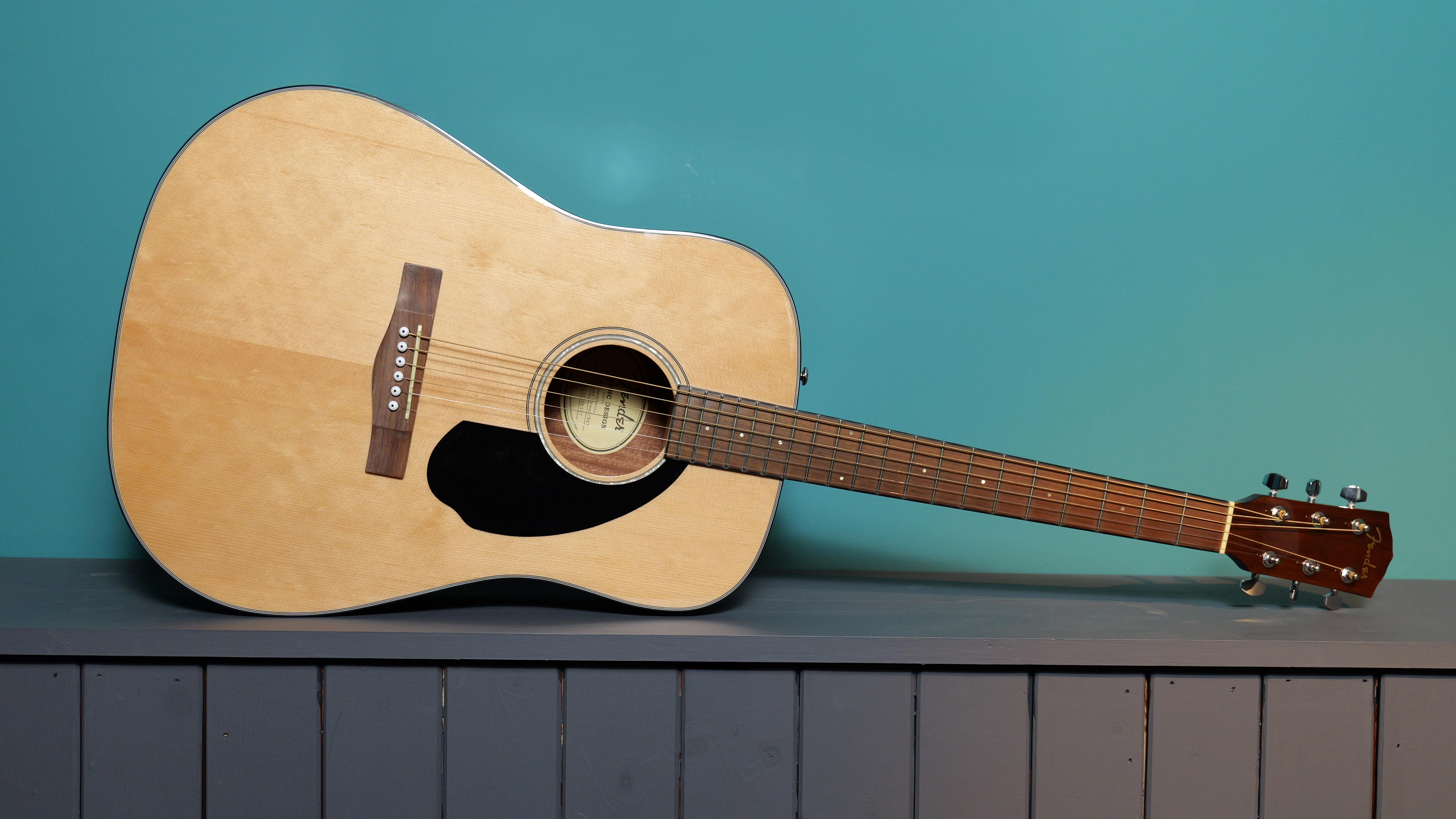
Specifications
Reasons to buy
Reasons to avoid
This is a beginner-grade instrument and is, therefore, best suited for newbie players.
✅ Buy if you want a big-name brand on a budget: Fender is the biggest name in the business, and the CD-60S is the perfect entry-level guitar from this legendary guitar maker.
❌ Avoid if you’re small or don't like large guitars: The dreadnought body of the CD-60S produces a massive sound, but it can be a little too large for some to hold.
Value: ★★★★★
Playability: ★★★★☆
Sound: ★★★★☆
Overall: ★★★★☆
In a nutshell: When it comes to finding the best acoustic guitar for beginners, I always recommend the Fender CD-60S (it's #1 in my guide covering the topic). In my opinion, this affordable guitar truly has it all. It is well-made, easy to play, and sounds superb!
The end of the market is indeed quite competitive, but for my money, this humble Fender dreadnought offers the most bang for your buck. Its combination of quality, playability, and sound makes it a standout choice for novice players.
Build: The construction of the CD-60S is impressive for its price point. It features a solid spruce top that delivers excellent resonance and projection, making the sound full and balanced, while the mahogany back and sides add warmth. During my tests, I found the sound to be rounded and vibrant, with plenty of volume, making it suitable for both solo playing and accompaniment. The hardware is pretty reliable too; the tuners hold tuning well even during rigorous playing sessions, and the bridge design ensures optimal string vibration and stability.
Performance: In our review, we praised this model’s comfortable neck, which is designed with a smooth finish and an optimal profile that's ideal for beginners. We mentioned, “Crucially, Fender gets the neck profile bang on. The CD-60S is a joy to play and backs this up with an impressive tone.” This guitar makes chords sound full and wide, yet retains a detailed midrange that really shines through in fingerpicking and strumming. The vibrant top-end adds a little magic to the mix, making it an engaging instrument to perform with.
Overall, if you’re in the market for your first acoustic guitar, I highly recommend checking the Fender CD-60S out. It offers an excellent balance of quality, sound, and comfort.

“I found the CD-60S to be one very playable dreadnought with a wide, well-balanced tone that belies its modest price. Ideal for beginners – fun for all.”
Read my full Fender CD-60S review
Best intermediate
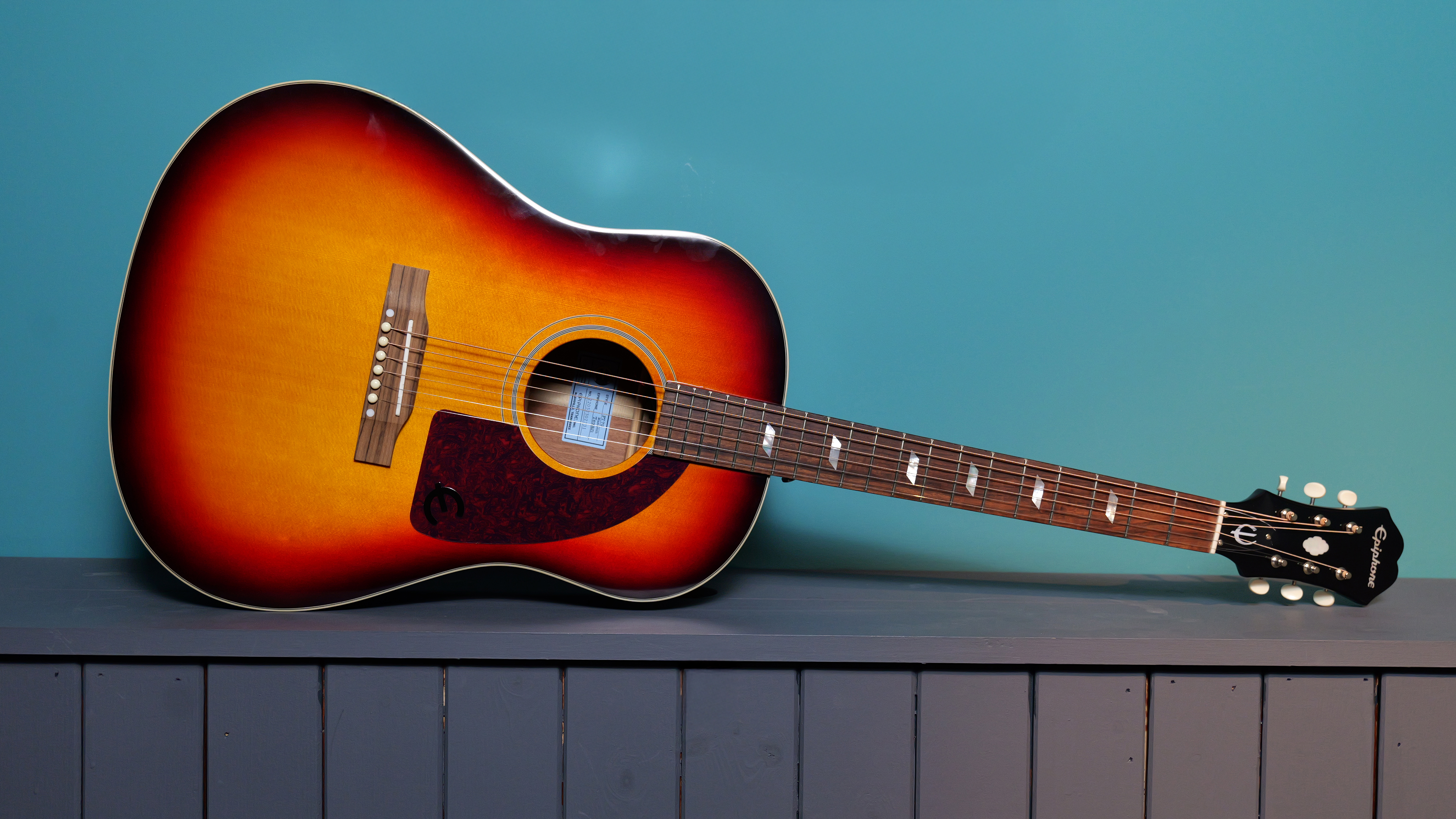
Specifications
Reasons to buy
Reasons to avoid
This model will best suit intermediate players looking for a reliable, gigable guitar that looks just as good as it sounds.
✅ Buy if you need a mid-priced acoustic with plenty of character: Here at Guitar World, we are big fans of the Epiphone Masterbilt Texan’s fabulous tone, superb playability, and reasonable price tag.
❌ Avoid if you aren’t a fan of the longer scale length: Unlike many other Gibson and Epiphone models, the Texan has a longer scale length of 25.5. So, if you’d prefer the classic Gibson feel, we’d suggest opting for the Epiphone Inspired By Gibson J-45.
Value: ★★★★☆
Playability: ★★★★☆
Sound: ★★★★☆
Overall: ★★★★☆
In a nutshell: One of the unsung heroes of the Epiphone stable of acoustics, the Masterbilt Texan is an exceptional value acoustic guitar that provides incredible sound quality and versatility for its price. Based on the model famously used by Paul McCartney to write the timeless classic ‘Yesterday,’ the Texan may not enjoy the same level of fame as the J-45 or Hummingbird, but it stands out as a remarkable instrument in its own right. With its strong heritage and robust construction, the Texan appeals to musicians looking for both historical significance and quality craftsmanship.
Build: Constructed with a solid Sitka spruce top, the Texan offers excellent projection and clarity. The back and sides are made from layered mahogany, known for its warm tonal qualities, creating a perfect balance for various playing styles. The SlimTaper neck profile is the perfect combination of slinky playability and heft, making it adept at a variety of techniques, from strumming to intricate fingerstyle. The guitar also features a rosewood fingerboard with elegantly designed parallelogram inlays, giving it a distinctive look without being overly flashy. Adding to its versatility, the Texan comes equipped with Fishman electronics, making it a great choice for the gigging guitarist who needs reliable amplification for performances.
Performance: The sound of the Texan is warm and well-balanced, producing a lovely acoustic voice that's rich and full-bodied. One of the defining characteristics is its high string tension, which contributes to its impressive volume and sustain. While the higher tension might pose a challenge for some players, especially those new to the guitar, the effort is well worth the reward - open notes ring out with a beautiful timbre, whether you’re fingerpicking or playing arpeggios. The guitar’s open chords resonate beautifully, with an extended sustain that seems to linger indefinitely.

“For less than a grand, you’re getting a lot of acoustic guitar with the Epiphone Masterbilt Texan. It’s a bit of an outlier versus the more popular J-45 and Hummingbird, but if you don’t fancy a shorter scale or the Hummingbird is a little too garish for your tastes, it’s a brilliant acoustic in its own right.”
Read my full Epiphone Masterbilt Texan review
Best professional
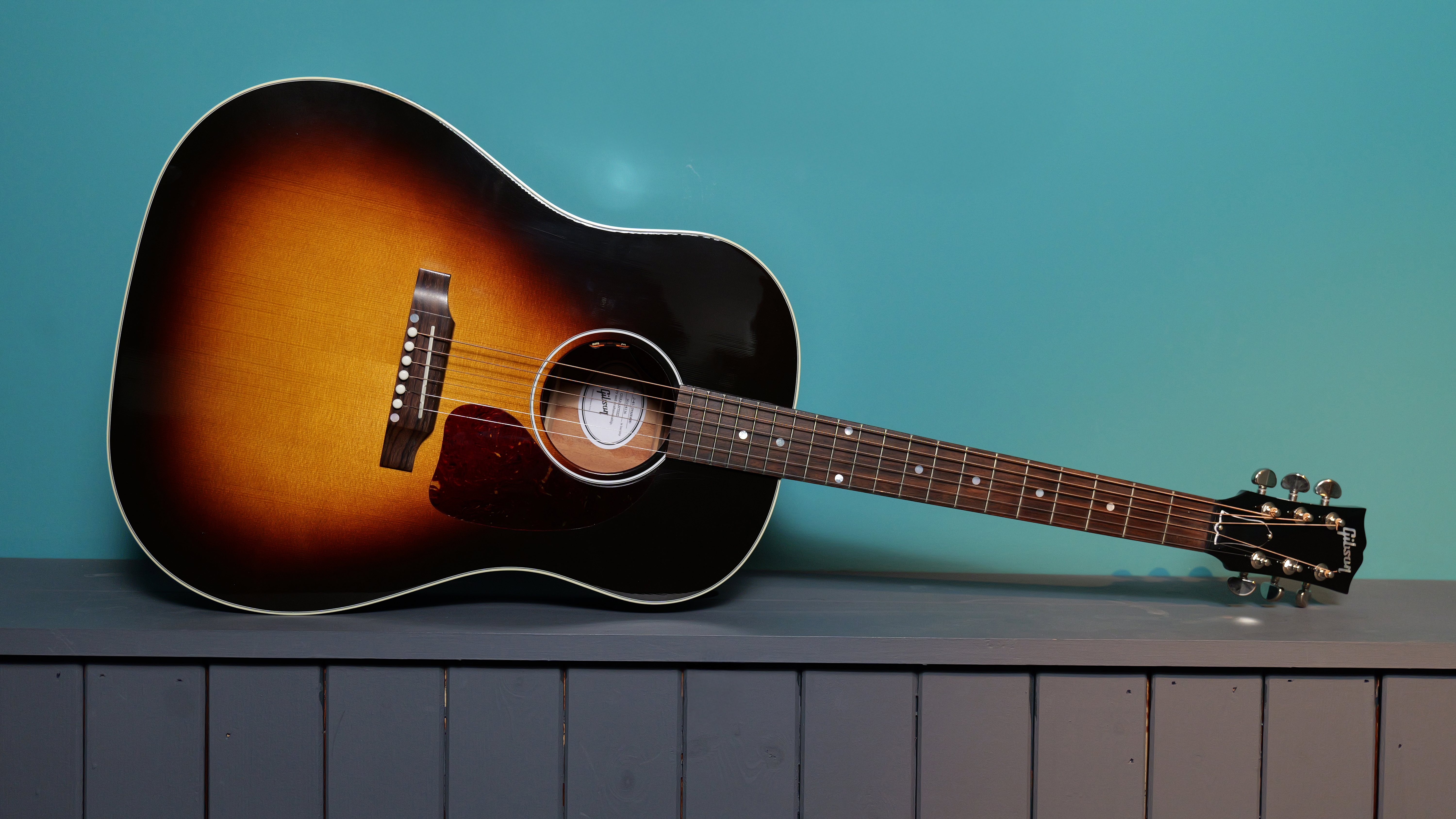
Specifications
Reasons to buy
Reasons to avoid
I’d say this is the ultimate professional-grade acoustic guitar. It’s ideal for both studio and stage work, and it’s reliable, sturdy, and very well made.
✅ Buy if you want a professional workhorse: The Gibson J-45 is a professional-grade acoustic guitar that is highly versatile and super playable.
❌ Avoid if you’re on a tight budget: Quality like this comes at a cost, and I am very aware that almost $3,000 is a lot for a guitar. If you are on a tight budget, I highly recommend trying the Epiphone Inspired By Gibson J-45.
Value: ★★★★☆
Playability: ★★★★★
Sound: ★★★★★
Overall: ★★★★½
In a nutshell: The J-45 has been spotted slung around the shoulders of many notable players, new and old, through the years, from Bob Dylan to Billie Joe Armstrong, Woody Guthrie, and Myles Kennedy. Favored for its understated looks and folksy charm, the guitar would go on to get the nickname “The Workhorse,” as it was seen as the working man’s flattop.
The loud, attention-grabbing tone contrasts its subtle beauty with a rich low-end and singing mid-range, which means it’s always heard, no matter the situation – and has been my personal choice for several years now.
Build: The J-45 Standard is renowned for its impressive build quality, which contributes to both its durability and tonal excellence. Crafted with a solid Sitka spruce top, this guitar offers a bright and responsive sound that matures beautifully over time. The body, constructed from solid mahogany, enhances warmth and depth, making it a favorite for players who seek a mid-focussed tone.
The attention to detail in the J-45’s construction is evident in its hand-scalloped bracing, which not only provides structural integrity but also allows the guitar to resonate fully, delivering that signature Gibson sound. Additionally, the smooth, nitro finish enhances the aesthetic appeal while allowing the wood to breathe, further enriching its tonal character.
Performance: For me, the J-45 is a great all-rounder. Whether played subtly with fingers or thumped with a pick, the J-45 always delivers. I’m a big fan of the L.R. Baggs VTC pickup system, too. This pickup does a very good job of reproducing the natural tone of this legendary Gibson model and is ideal for gigging and recording.
The guitar in the demo video below was kindly provided by the folks over at PMT in the UK, as we were having difficulties sourcing one directly from Gibson at the time of the video shoot. This is a very popular model, and therefore, it’s not always in stock when we need one.

"There is a lot to love about Gibson's iconic J-45, and this modern version certainly lives up to the history that surrounds this legend of the acoustic world. With effortless playability, charming good looks, and a distinctive sound that is instantly recognizable, it's no wonder that the J-45 is still going strong over 80 years after it was first introduced."
Read my full Gibson J-45 Standard review
Best classical
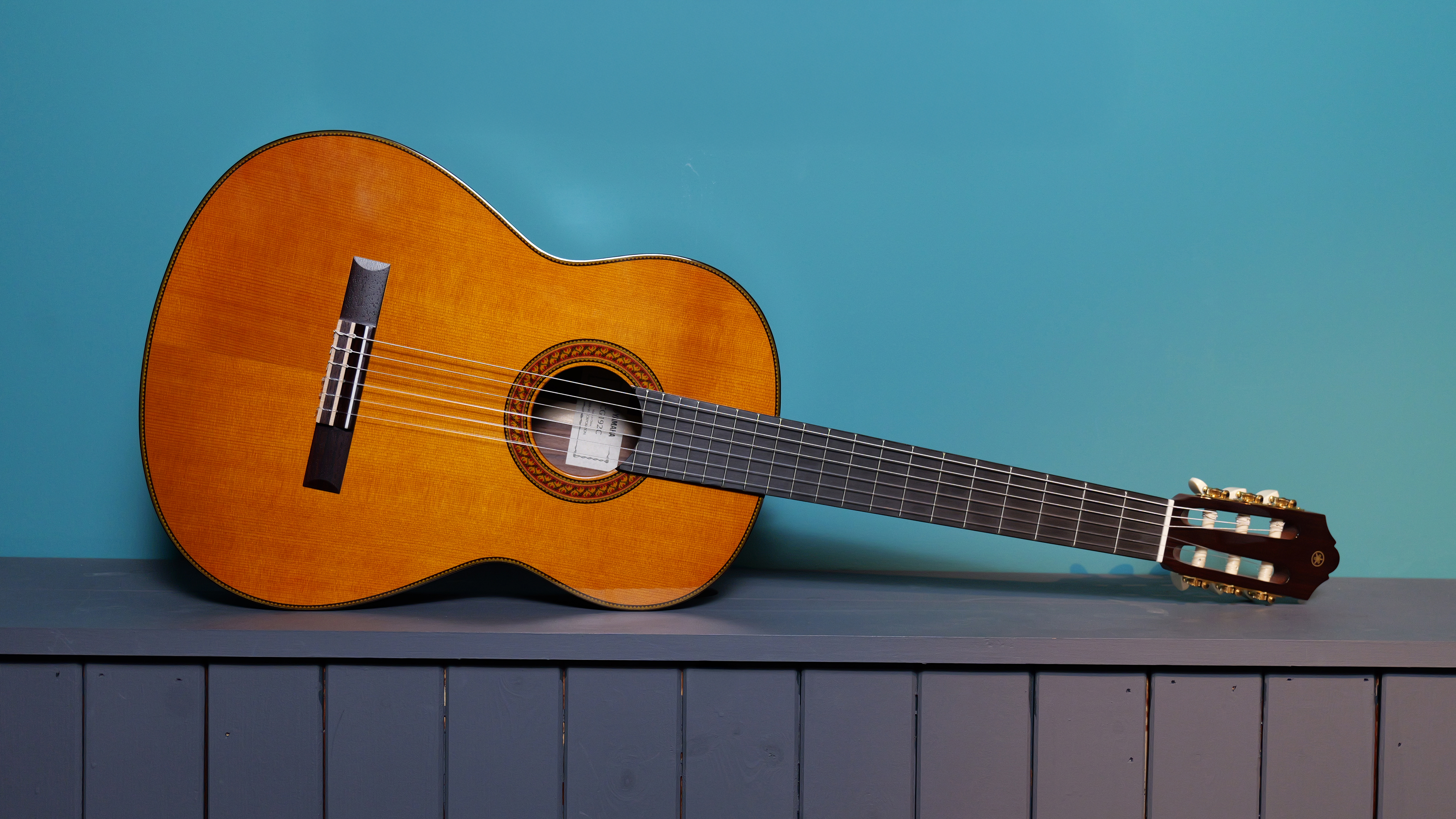
Specifications
Reasons to buy
Reasons to avoid
This is my top pick for classical guitarists.
✅ Buy if you want a reliable classical: Yamaha are well known for their outstanding quality and reliability, and the CG192 is no different. This guitar will last a lifetime.
❌ Avoid if you don’t need nylon strings: Classical guitars are designed to play a very specific style of music, so if you aren’t planning on taking up flamenco, then I’d opt for a steel-strung guitar.
Value: ★★★★★
Playability: ★★★★☆
Sound: ★★★★☆
Overall: ★★★★☆
In a nutshell: Sitting at the top of Yamaha’s highly popular CG series, the CG192C is a wonderfully playable, mid-priced classical guitar. True to Yamaha’s reputation, it embodies the brand’s core qualities: durability, great value for money, and a pleasing tone. A really fine example of a classical guitar for the money.
Build: With a solid Western red cedar top, layered rosewood back and sides, and an ebony bridge and fingerboard, the CG192C isn’t just aesthetically pleasing but also built to last. Its satin-smooth neck and flat-radius fingerboard make it a dream for fingerstyle guitarists. Whether you’re a classical player seeking a reliable secondary instrument or moving into intermediate levels, the CG192C deserves serious consideration.
Performance: While the smaller body of the CG192C doesn't deliver a booming low end, that’s not really what classical guitars aim for. Instead, it shines in the midrange, offering a clear, crisp response that fingerstyle players will appreciate for its precision and clarity. Overall, if you’re looking for a classical workhorse, look no further.

“There aren’t many brands that can match Yamaha in producing well-made instruments at such reasonable prices. With its comfortable satin-smooth African mahogany neck, warm yet articulate solid Western red cedar top, and elegant wooden body binding, this brilliant mid-priced classical guitar is truly a workhorse.”
Read my full Yamaha CG192C review
Best for travel
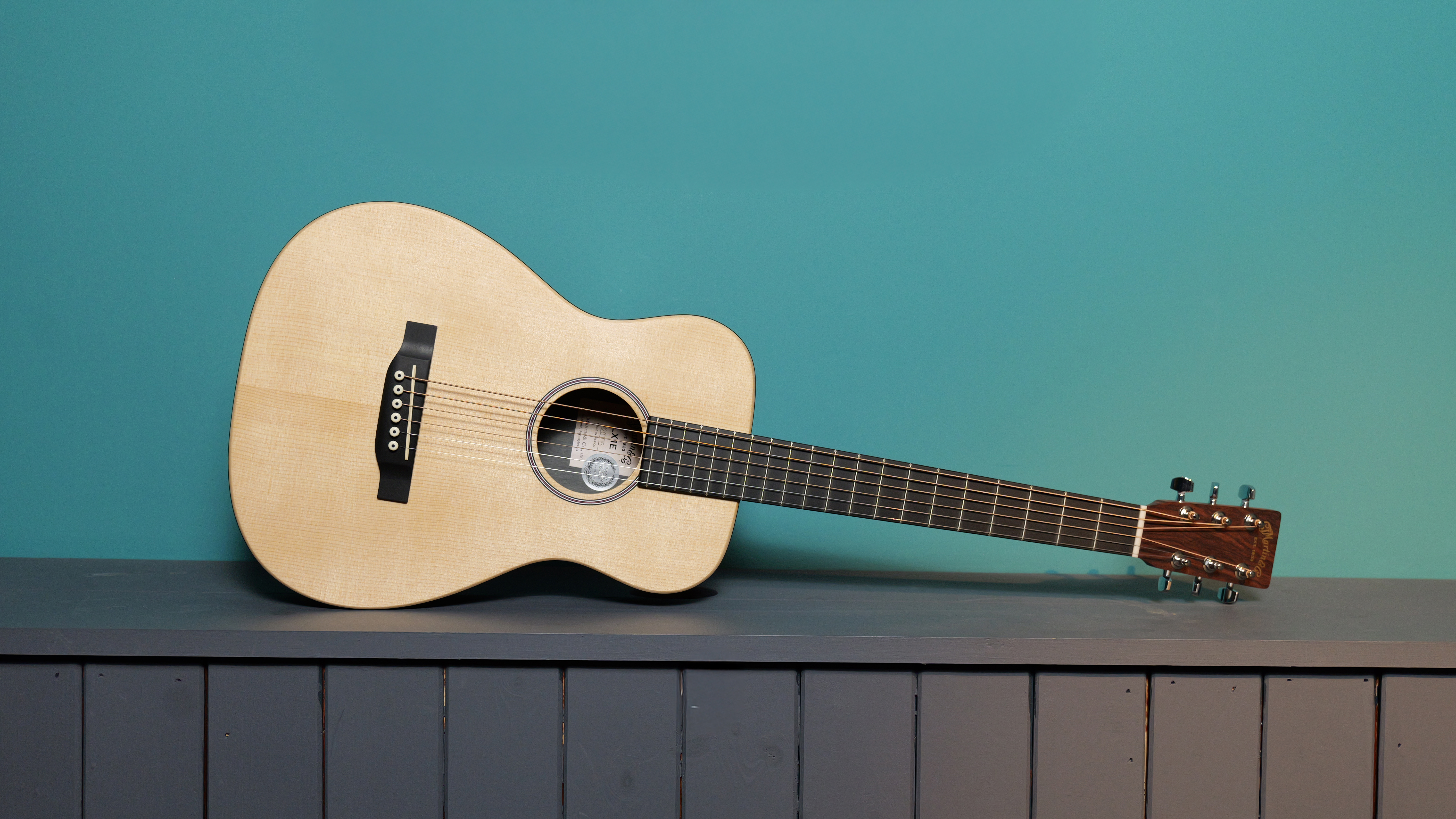
Specifications
Reasons to buy
Reasons to avoid
The LX1E is the ultimate travel guitar and is ideal for players on the move.
✅ Buy if you want an excellent guitar for traveling: With its compact size and rugged design, this is, in my opinion, the best travel guitar on the market, hands down.
❌ Avoid if you want a regular guitar: If you don’t need a travel companion, there are much better models out there for this price.
Value: ★★★★☆
Playability: ★★★★☆
Sound: ★★★★☆
Overall: ★★★★☆
In a nutshell: For me, the Martin LX1E redefines what a small-sized dreadnought can achieve. While initially marketed as a travel acoustic guitar, easily packed into the included gig bag for convenience, it quickly becomes clear that this instrument is destined for much more than just travel.
Build: The LX1E is crafted with exceptional attention to detail, featuring a solid Sitka spruce top that delivers a bright and vibrant sound. It feels robust and very sturdy. Despite its compact size, this guitar surprises with a powerful volume that easily surpasses other small-body acoustics. The sound is rich, with a lovely bass presence coupled with bright mids and highs, all of which respond beautifully to your playing style. Whether you’re strumming chords or delicately fingerpicking, the LX1E offers a dynamic range that makes every note shine.
Performance: With the onboard Fishman Sonitone electronics, the Martin LX1E becomes a versatile performance instrument. The soundhole controls keep the aesthetics clean and streamlined, allowing you to focus on your music. When amplified, the LX1E projects a stunningly rich tone that rivals larger guitars, making it an ideal choice for performers. Its natural sound is enhanced, letting your personality and style come through in every performance. For gigging musicians who demand quality and reliability without sacrificing sound, the Martin LX1E is an unbeatable option that exceeds expectations.

“There’s a reason why the Martin LX1E is one of the most popular small-bodied acoustic guitars – it sounds great, particularly plugged in, and it’s really comfortable to play. It doesn’t quite have the projection and low end of a full-sized acoustic, but for me, it’s a superb choice if you’re seeking a quality, compact acoustic for traveling or gigging.”
Read my full Martin LX1E Little Martin review
Best electro
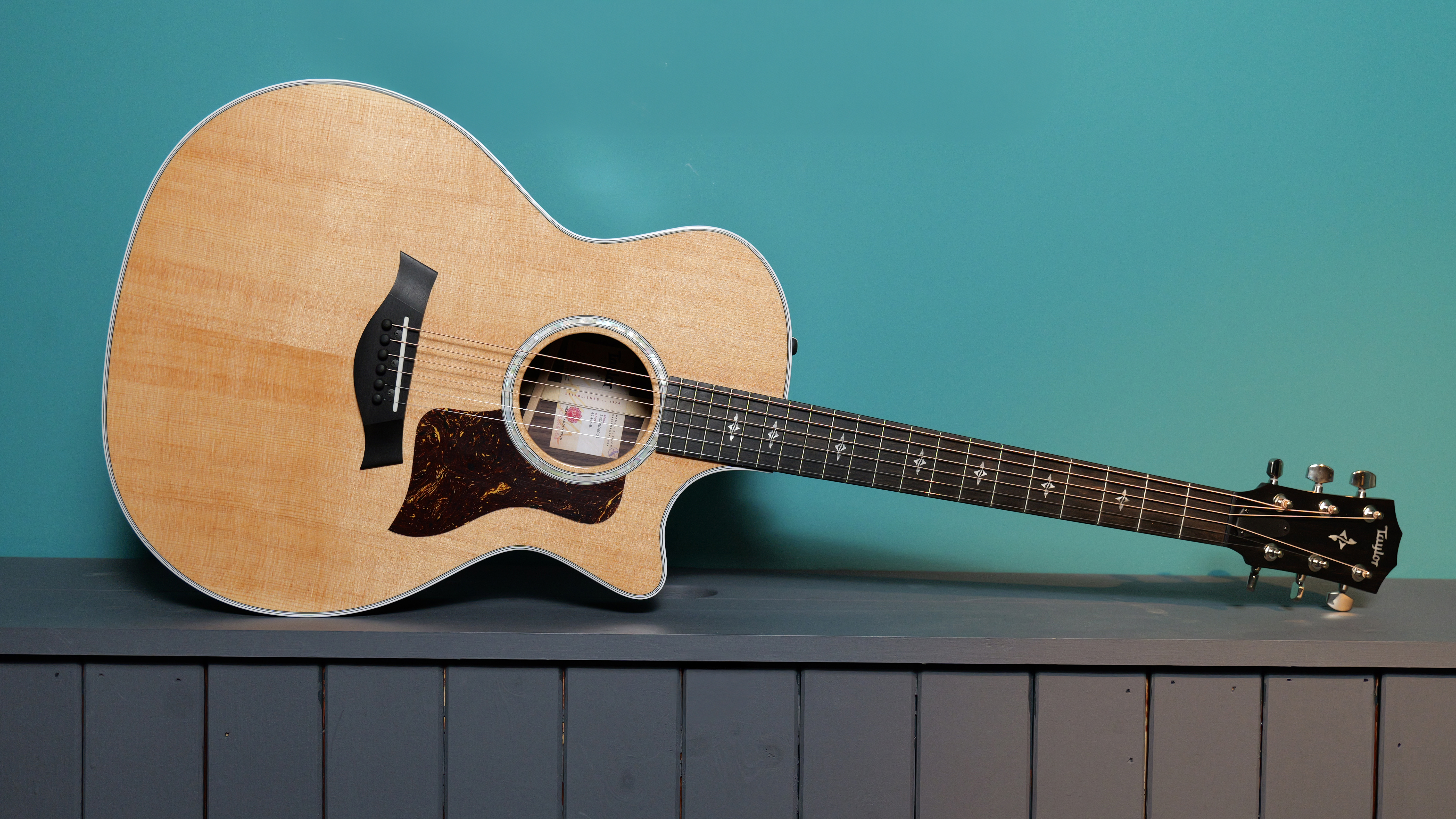
Specifications
Reasons to buy
Reasons to avoid
This is a professional-grade guitar aimed at serious gigging musicians.
✅ Buy if you need an outstanding amplified tone: The ES2 pickup system produces a natural, warm, and seriously versatile amplified sound.
❌ Avoid if you don’t like bright-sounding acoustic guitars: Taylor is known for their shimmering high-end, and it can be too much for some players.
Value: ★★★★☆
Playability: ★★★★★
Sound: ★★★★★
Overall: ★★★★½
In a nutshell: Bob Taylor may not have realized the impact of launching the Grand Auditorium body shape in 1994, but it quickly became Taylor’s most popular design and remains a top choice today – and is my top choice for those seeking a world-class electro acoustic guitar.
Build: The 414ce, part of the 400 series, is a fantastic representation of the GA shape, featuring a classic tonewood configuration of a solid Sitka spruce top and solid Indian rosewood back and sides.
This combination is favored for its well-rounded, balanced tone, particularly with the exceptional cuts that Taylor employs. The result is a beautifully prominent high-end sparkle paired with warmth in the low end without overwhelming the overall sound. It also doesn’t harm the fact that it looks very pleasing to the eye.
Performance: Also, Taylor’s ES2 pickup system captures the guitar’s acoustic brilliance beautifully when plugged into a PA or amplifier, making it our top choice for the best electric acoustic in this guide. As you’d expect for a guitar at this price point, a wooden hard case is also included – making it an excellent option for working musicians.

“In my opinion, the 414ce is the ultimate ‘does-it-all’ acoustic guitar. With its fast-playing neck and low action straight from the factory, it’s a dream to play. The fully solid Sitka spruce top and Indian rosewood back deliver rich, sustained tones that will impress any player.”
Read my full Taylor 414ce review
Best jumbo
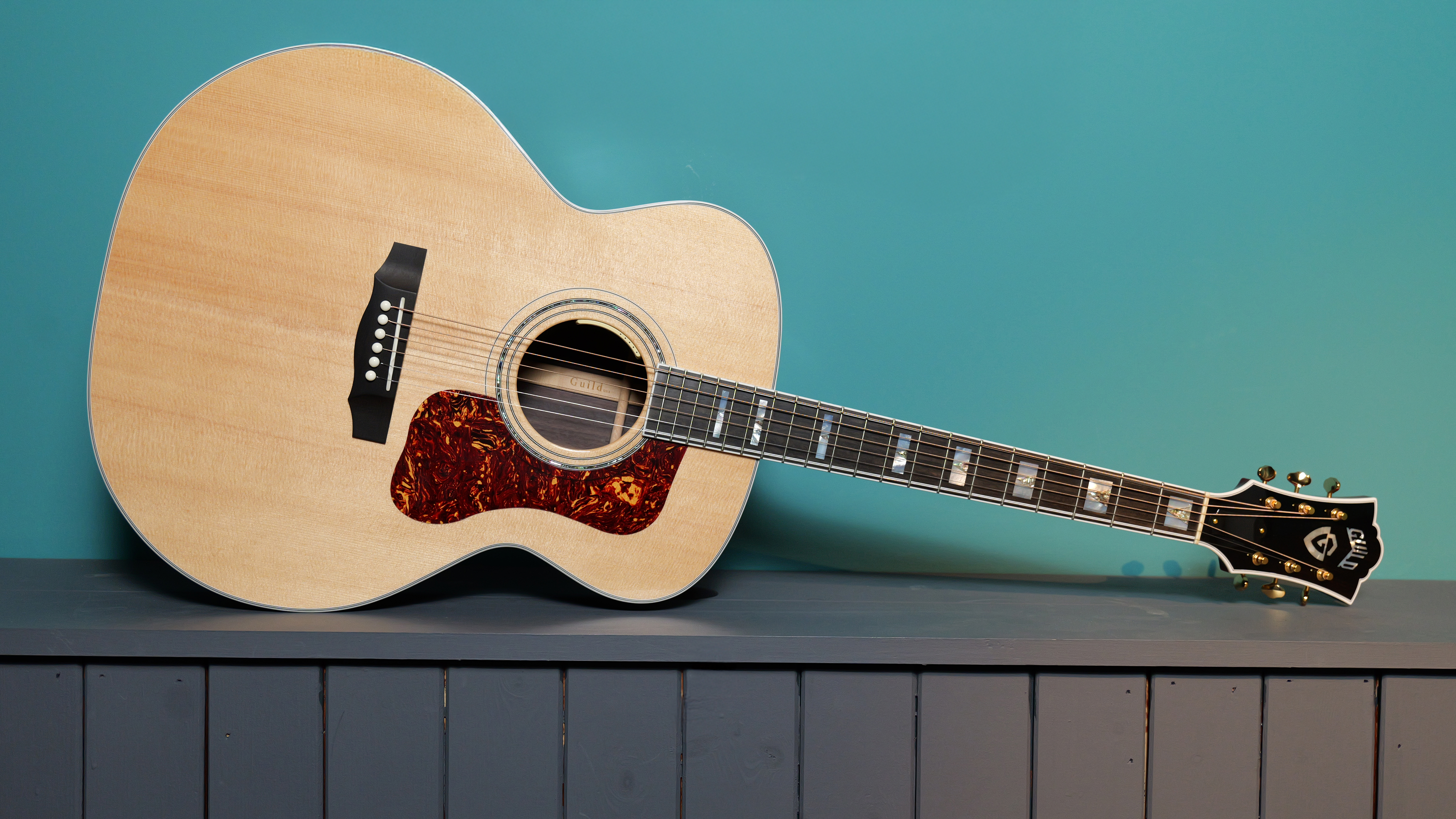
Specifications
Reasons to buy
Reasons to avoid
The F-55E is a high-end model and will better suit a more experienced player.
✅ Buy if you want a massive tone: This guitar sounds huge. With a deep bass and sparkling highs, this is one of the best-sounding jumbo acoustics on the planet.
❌ Avoid if you like smaller guitars: This is a jumbo model and, therefore, isn’t suited to smaller players.
Value: ★★★★☆
Playability: ★★★★★
Sound: ★★★★★
Overall: ★★★★½
In a nutshell: Next up, I have chosen something a bit special. Something from the extremes of acoustic guitar excellence. The gorgeous Guild F-55E. I am a massive fan of this ginormous guitar. The F-55E is, in our experience, a tonal behemoth, a fine example of how good a jumbo guitar can sound when it’s done correctly.
Build: In my glowing review, I praised this guitar's outstanding build, saying, “The tight, even grain pattern of the pale solid spruce top is a work of art, perfectly framed by brilliant white binding and an ornate rosette of abalone and ABS rings. The timeless charm continues to the rear of the guitar. The solid Indian rosewood back and sides are fully displayed under the sheen of the nitro finish, showcasing the high-quality woods used. There is no mistaking that this is a high-end guitar that's been expertly crafted in Oxnard, California.”
Performance: The neck on this guitar is joyous to play on straight out of the box, with a low action and smooth playing feel that responds superbly to any play style. Pluck gently with your fingers, and it responds with open ease. Strum hard with a pick, and it responds with a huge attack - but with no loss of definition.
In reality, what we have here is a guitar to savor. Everything from the tonewoods employed to exquisite tones that'll make your knees wobble through to the advanced LR Baggs electronics.

“The Guild F-55E is a stunningly crafted acoustic that delivers a sound that is second to none. Its bold, loud, and characterful tone will make anyone fall in love with the majesty of a jumbo acoustic.”
Read my full Guild F-55E review
Best hybrid
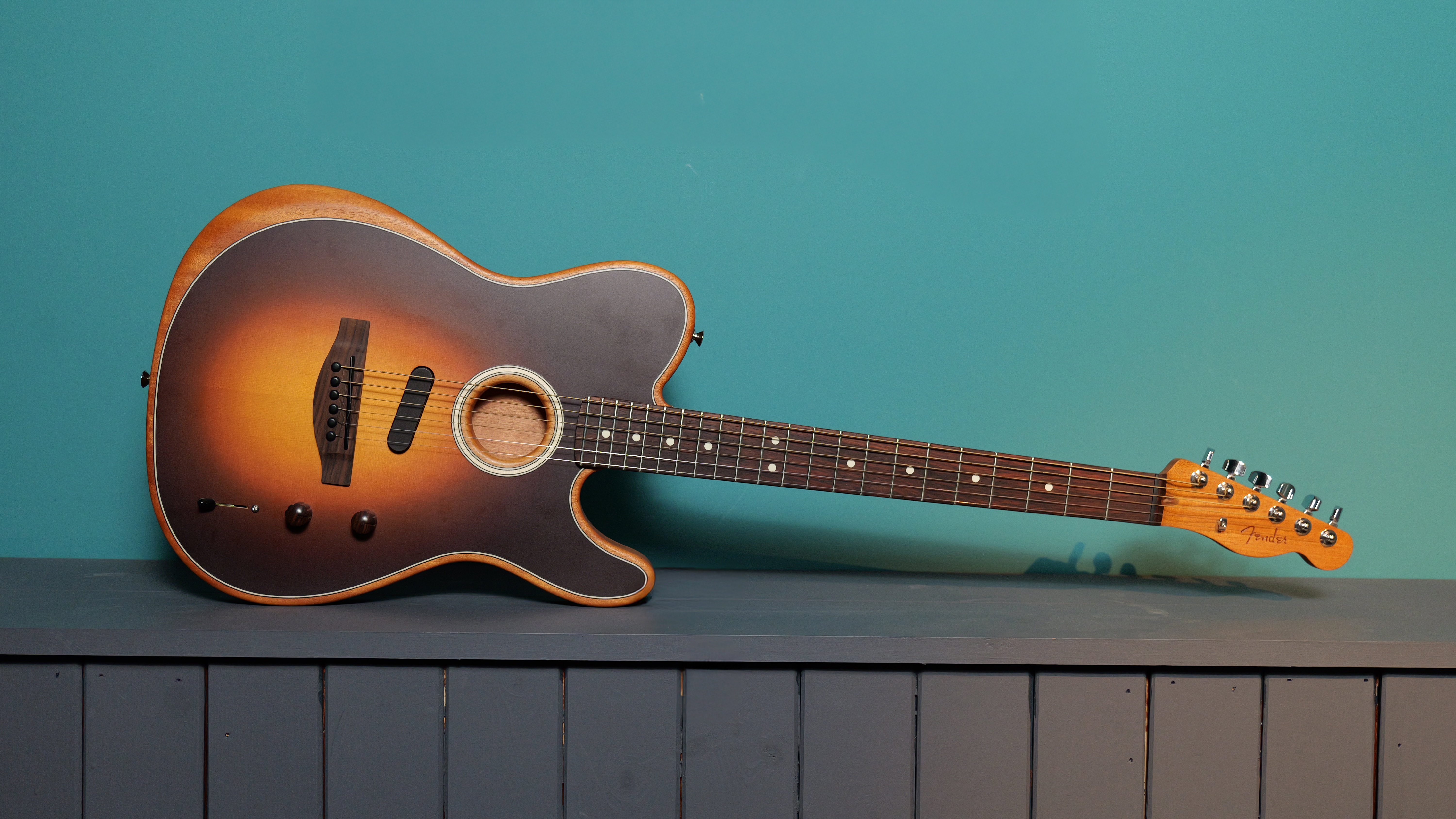
Specifications
Reasons to buy
Reasons to avoid
This model is best suited for electric guitarists who want the playability they are used to but with acoustic sounds.
✅ Buy if you need versatility: Combining the sounds of an electric and an acoustic, I’d go as far as to say there isn’t a more versatile guitar on the market right now.
❌ Avoid if you just want an acoustic: While it’s great to have so many sounds included in the Acoustasonic, you may not actually require them – so you’d be better with a standard acoustic guitar.
Value: ★★★★☆
Playability: ★★★★★
Sound: ★★★★☆
Overall: ★★★★☆
In a nutshell: Okay, so the Fender Acoustasonic is a pretty tricky instrument to define. Is it an electric or is it an acoustic? Well, really, it’s both, and that’s why I’m confident enough to include it in my guide to the best acoustic guitars.
Build: The precise contours of its mahogany body have soft-rolled edges and a comfortable forearm bevel that seamlessly flows into the solid Sitka spruce top, capping off a novel Tele-shaped visage outlined by its binding and understated rosette. The rounded mahogany sound port is part of Fender’s patented String Instrument Resonant System (SIRS), which contributes to the guitar’s lively projection and fuller voice despite having Telecaster dimensions.
Performance: Marrying up the projection and woody sounds of an acoustic with the unique form and function of a Telecaster, this guitar is sure to turn heads. But hidden behind the unique visual stylings is a guitar, which gives you plenty of room to experiment.
Some pretty advanced electronic trickery allowed me to choose between a plethora of acoustic or Tele tones or even blend them up to create something completely new. It's crazy, but I liked it.
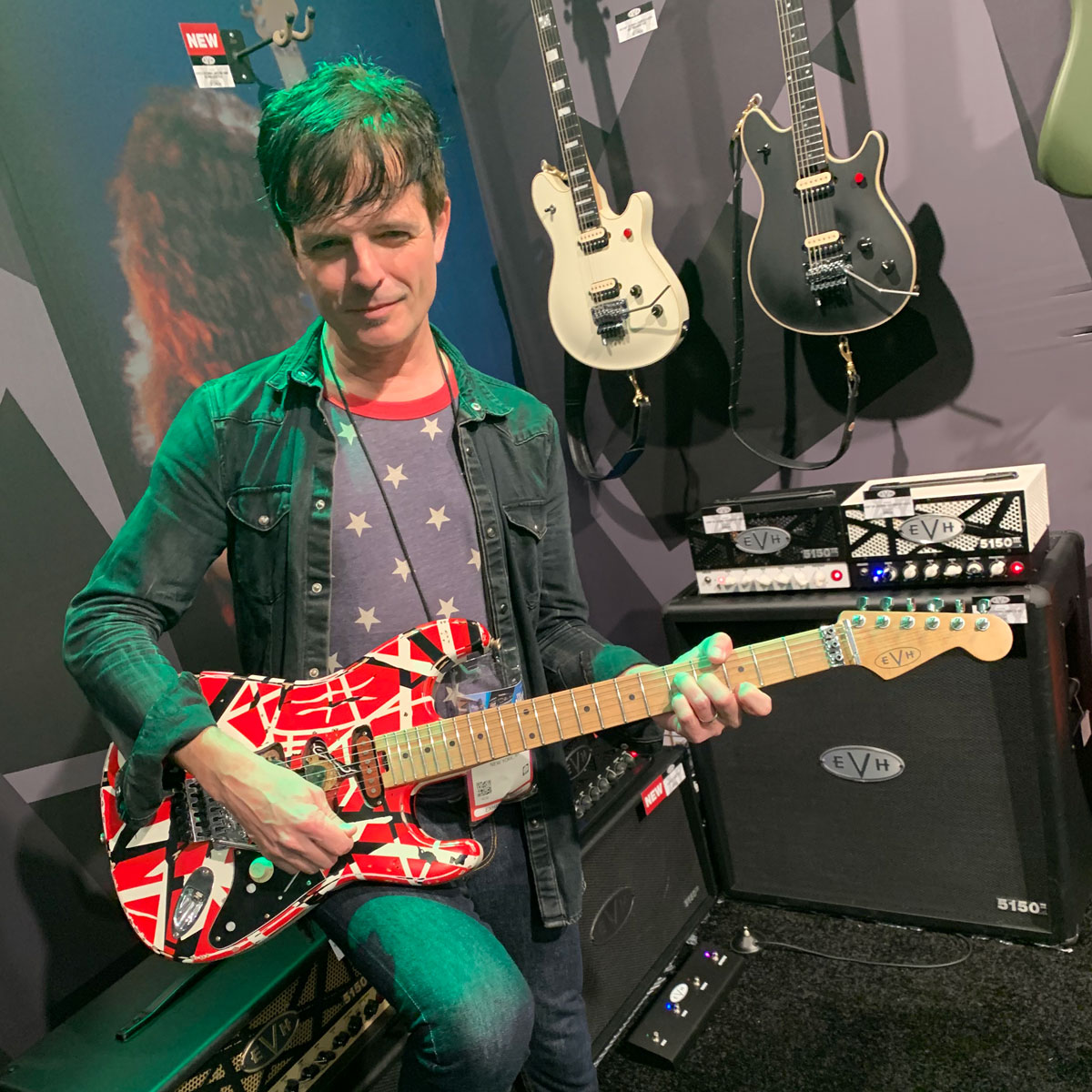
“The Fender Acoustasonic Telecaster is a major innovation for its curated collection of acoustic and electric tones that provide endless combinations, along with easy playability and lightweight, all of which make it a new benchmark in acoustic-electric design.”
Read my full Fender Acoustasonic Telecaster review
Spec comparison
Take a look at how our top choices compare side-by-side.
Model | Price | Style | Solid Top | Electronics | Most Suited For |
|---|---|---|---|---|---|
Martin D-28 | $3,199/£2,999 | Dreadnought | Yes | Yes | Professionals/ serious players |
Yamaha FG800 | $229/£219 | Dreadnought | Yes | No | Beginners |
Fender CD-60S | $199/£189 | Dreadnought | Yes | No | Beginners |
Epiphone Masterbilt Texan | $799/£799 | Dreadnought | Yes | Yes | Intermediates/Pro |
Gibson J-45 Standard | $2,999/£2,599 | Dreadnought | Yes | Yes | Professionals/ serious players |
Yamaha CG192 | $569/£539 | Classical | Yes | No | Classical players |
Martin LX1E | $549/£515 | Travel | Yes | Yes | Kids/ traveling musicians |
Taylor 414ce | $2,999/£2,699 | Grand Auditorium | Yes | Yes | Professionals/ serious players |
Guild F-55 | $4,599/£3,699 | Jumbo | Yes | Yes | Professionals/ serious players |
Fender Acoustasonic Player Telecaster | $1,191/£899 | Telecaster | Yes | Yes | Electric players |
Also consider
Taylor GS Mini
Guitar World's score: ★★★★☆
The GS Mini is essentially a scaled-down version of the popular Taylor Grand Symphony-shaped acoustic. During testing, we loved its smaller size, as it makes it ideal for leaving around the house ready to pick up and play while you're waiting for the microwave to ping. Despite the shorter scale, the string spacing is still that of a regular-size guitar, so it feels great for fingerpicking.
It's got that very bright and clear tone that's a signature of most Taylor guitars. Whilst slightly lacking in the volume department unplugged, you can more than make up for it with the onboard ES-B acoustic guitar pickup, which allows this great guitar to compete with its full-sized siblings when playing live.
Read more: Taylor GS Mini review
Epiphone Inspired By Gibson J-45
Guitar World's score: ★★★★★
If you’ve been following the prices of the Gibson J-45 over the last few years, then you’ll have noticed a rather sizable increase – you won’t get much change back from $/£2500 right now - and it’s looking like the prices won’t be coming down anytime soon.
Every element has been carefully considered, even down to the finish. Gone is the thick plastic-feeling lacquer, in favor of a soft and supple aged finish that we found a delight to play with during our testing. So, if you are looking for those classic acoustic sounds of yesteryear but don’t want to fork out a small fortune, it’s definitely worth considering this fantastic guitar.
Read more: Epiphone Inspired By Gibson J-45 review
Martin SC-13E
Guitar World's score: ★★★★½
It pays not to stand on ceremony when you are designing a guitar. Let fresh thinking follow its own logic. That’s how we end up with guitars such as Martin’s SC-13E – an electro-acoustic the likes of which we have never seen before.
Look at the body shape for a start, that squashed offset cutaway tears up the rulebook. That’s just for starters; flip it over, and you’ll see the Sure Align neck system, with that deep carve allowing for full access to the top of the neck. The system allows for on-the-fly neck pitch and intonation tweaks.
The top is Sitka spruce, the back and sides are mahogany with a thin koa veneer for some visual pizazz. Martin saves the last of the fireworks for the playability, with an action so low that might catch those used to wrestling chords out of their acoustic unawares. This is a daring guitar, playable with a stunning voice that sits so well in a mix.
Read more: Martin SC-13E review
Glossary of terms
I know the terms used when talking about acoustic guitars in this guide can be confusing. So, before we dive into the advice, here are the meanings behind common terminology you'll see in this guide and beyond.
Action: Action refers to the height of the strings above the fretboard. Proper action is crucial for comfortable playing and can vary based on personal preference and playing style.
Back and sides: Again, like the top, the back and sides of an acoustic guitar can be made from a variety of different woods. At this price point, you’ll mostly see laminate construction, as all solid guitars are generally a lot more expensive.
Body style: Acoustic guitars come in various shapes and sizes, from parlor and grand auditorium to dreadnought and jumbo. Typically, which is right for you at this stage in your playing career comes down to size. We go into more detail about the sizes below.
Bridge: The bridge is the component attached to the body of the guitar where the strings are anchored. It also houses the saddle and aids in sound transmission from the strings to the body.
Dreadnought: Large, boxy body with a powerful, boomy sound and lots of volume. Named after a battleship, which tells you everything you need to know. Great for strumming.
Electronics: When we talk about electronics in the context of acoustic guitars, we refer to the pickup system, preamp, or even an onboard tuner. Of course, at this early stage of your playing, you don’t necessarily need a pickup, but if you have aspirations of playing live, you’ll want to consider a model with electronics.
Fingerboard: The fingerboard is the playing surface of the neck of the guitar. This can be made from everything from rosewood to walnut, Richlite, and pau ferro. Each brings their own characteristics to the table, and which you like mostly comes down to personal preference.
Frets: Frets are the metal strips embedded along the fingerboard. They divide the fingerboard into sections, enabling players to accurately finger notes and chords.
Grand Auditorium: A modern take on the auditorium shape, usually with a more pronounced waist. Super versatile and comfortable, it works for pretty much any style.
Grand Concert: Slightly larger than a concert, with a more defined waist. Balanced tone that’s great for fingerstyle and lighter playing.
Jumbo: Even bigger than a dreadnought, with rounded shoulders and a huge sound. Maximum volume and bass response. It can be a bit unwieldy, but it sounds massive.
Nut: The nut is a small piece typically made of plastic, bone, or synthetic materials located at the top of the neck. It holds the strings in place and keeps them spaced correctly.
Parlor: Old-school small-bodied guitar from the 1800s-early 1900s. Intimate, focused sound that’s great for blues, folk, and fingerpicking. Comfortable for couch playing.
Pickup: While primarily associated with electric guitars, acoustic pickups can amplify sound in acoustic models. There are various types, including under-saddle pickups and microphone systems, that influence how the guitar's sound is captured and amplified.
Scale length: Simply put, the scale length refers to the distance between the top nut and the saddle on the bridge – and is used to measure the total playable length of the instrument.
Saddle: The saddle is located on the bridge of the guitar and serves to support the strings and transfer their vibrations to the body of the guitar. It can be made from various materials, including plastic, bone, or wood.
Soundhole: The soundhole is the opening on the top of the guitar body that allows sound to escape. It plays a critical role in the tonal quality and volume of the instrument.
Tuning pegs: Tuning pegs, also known as machine heads, are located on the headstock and are used to adjust the tension of each string, which in turn alters its pitch.
Truss rod: The truss rod is a metal rod running along the neck of the guitar that allows adjustment of the neck's curvature. This is important for maintaining proper action and playability.
A brief history of acoustic guitars
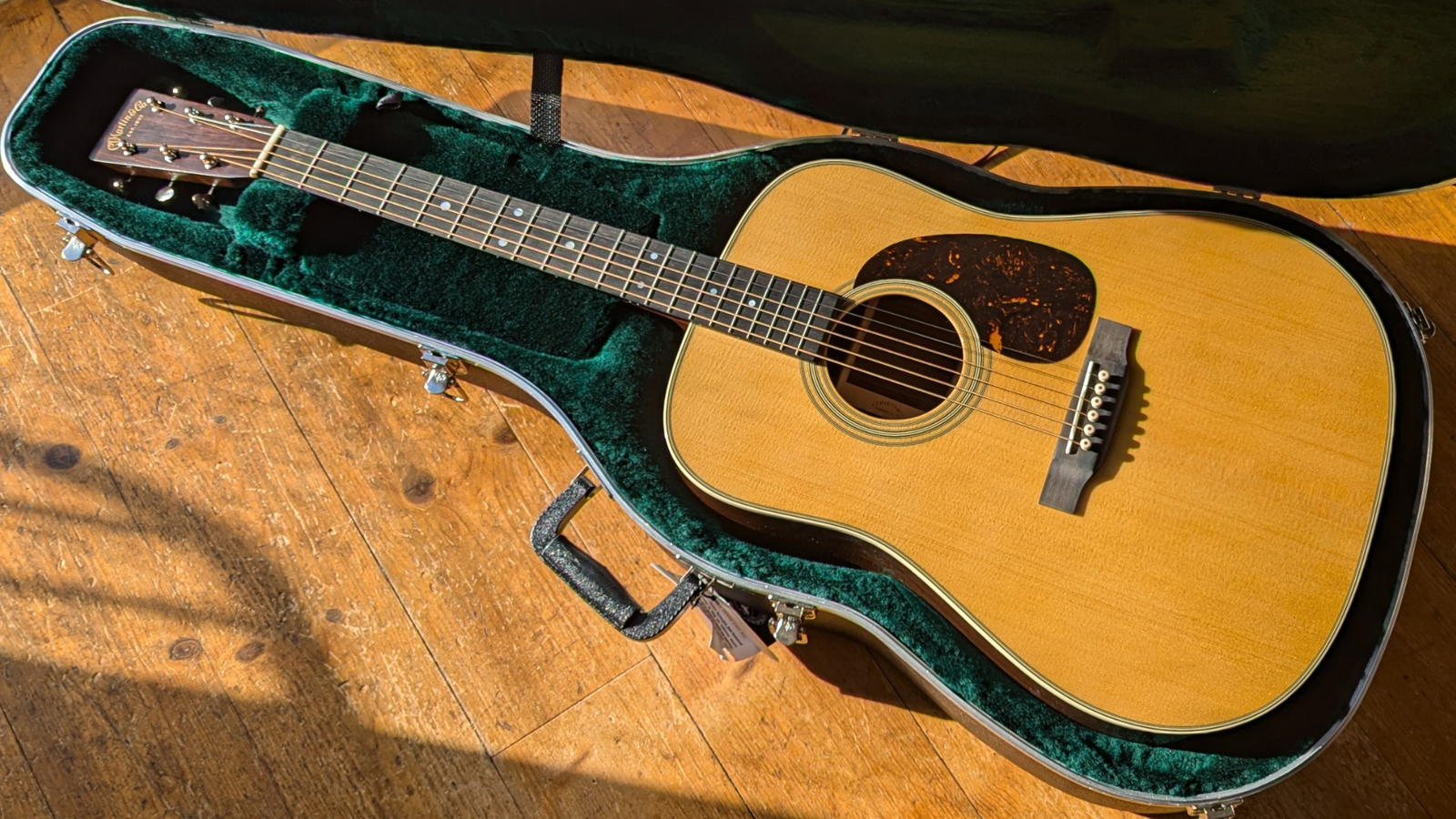
Acoustic guitars have been around much longer than their electric counterparts, with very early incarnations dating back centuries. The steel-string acoustic guitar as we know it today can be traced back to the mid-1800s, and credit is largely given to CF Martin (of Martin Guitars).
Martin created the first dreadnought guitar, which is still one of the most popular body shapes today. Things have come on a lot since then in terms of shapes, woods, features, etc, so when looking for the best acoustic guitar, it’s important to consider a few key points before committing.
Think about the sound you want, and what sort of music you’re playing - are you a singer-songwriter looking to back up your vocals; are you playing mostly instrumental music, or playing in a full band? If you’re looking to play live, then a pickup will be useful.
Budget plays a part when seeking the best acoustic guitar too - do you want something to learn on, or are you looking to upgrade to something that will last for years to come, with a good resale value? Gibson and Martin make some incredibly desirable acoustics, but the likes of Epiphone and Yamaha can still give you great sound on a tighter budget.
How to choose the right acoustic for you
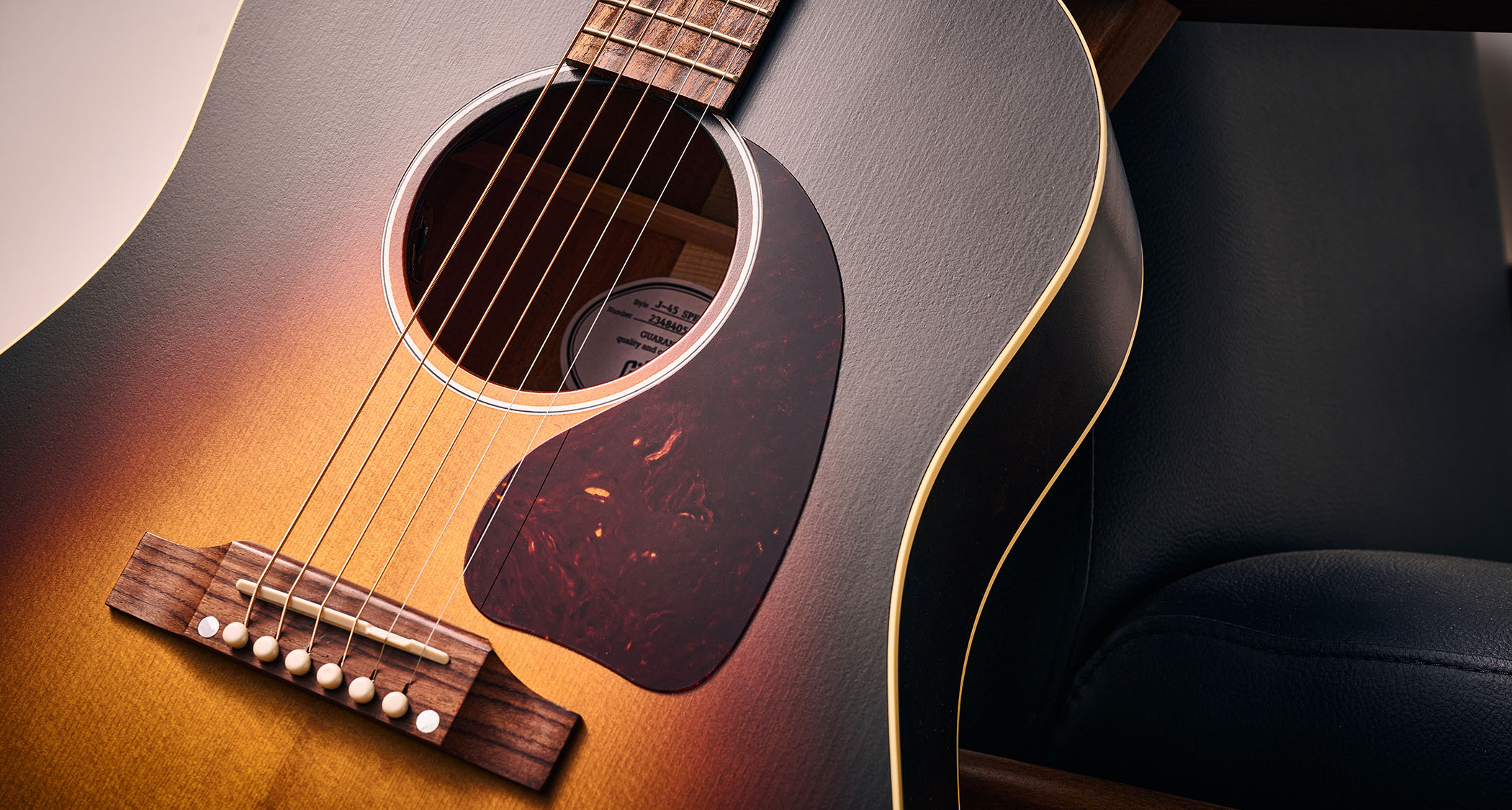
Below, I've compiled a wealth of information to help you make an informed decision when buying your next acoustic guitar, drawing from my decade of experience in buying, selling, and reviewing guitars.
Size: Think carefully about the size of the guitar. Do you need a travel acoustic, small-bodied acoustic, dreadnought, or jumbo? Unsure what that means? I've provided detailed descriptions of different guitar sizes later in this guide. Ideally, you want a guitar that allows you to comfortably drape your right arm over the body and reach the end of the headstock without straining when seated.
Brand: Consider well-established brands like Fender, Gibson, Martin, Yamaha, and Taylor. These names are synonymous with quality and reliability, making them excellent starting points.
Amplification: If you anticipate playing in front of an audience, consider whether you want to amplify your sound. You can either retrofit an acoustic guitar with a pickup or choose an acoustic-electric guitar that already features built-in electronics.
Reviews: Once you've narrowed down your choices, take a deep dive into reviews. Remember, not all reviews are equal. For a well-rounded perspective, seek out insights from both professional reviewers and user-generated feedback on forums. This balanced approach will provide you with the knowledge necessary to make a confident choice.
With these considerations in mind, you’re well on your way to finding the perfect acoustic guitar for your needs.
FAQs
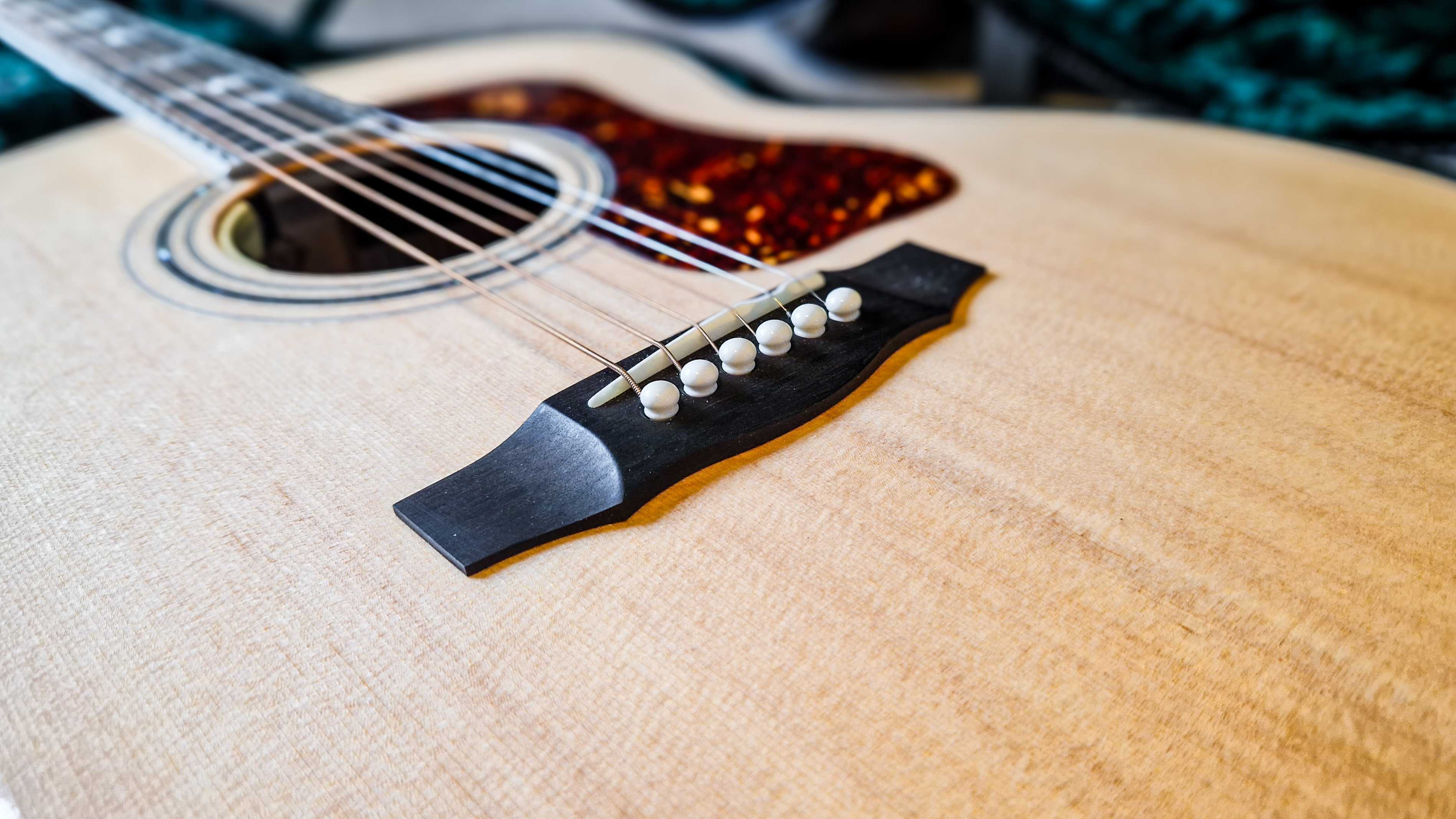
Which acoustic guitar body shape should I go for?
The shape of an acoustic guitar’s body affects the sound, and how comfortable it is for you to play. If you’re of smaller stature, then you might find something with a smaller body easier to play, though, of course, there are no set rules for this - it’s all subjective.
The body shape also affects tone and volume. If you think of the top of an acoustic guitar working a little like a speaker cone, then a bigger top can move more, thus making it louder when played hard. A guitar with a smaller top has less surface area to move, so it won’t project as much - even if you hit it with the same attack, you’ll reach its maximum headroom quicker. That’s not to say that bigger is always better - if you play with a lighter touch, then you’ll probably find that you get more response out of a smaller-bodied acoustic; it will react better to your playing.
Bigger-bodied guitars like the dreadnought and jumbos usually have a stronger bass response than smaller ones, as well as a tight top end. This leaves room for vocals to sit nicely in a mix. Smaller-bodied guitars like the concert are usually a little brighter and mid-focussed and grand concerts, which are the same shape but a little bigger, can provide a really nice balance.
Which wood is best for my acoustic guitar?
A lot of an acoustic guitar’s tonal character comes from the woods used in its construction. Solid wood is usually preferable, as it moves more than laminated wood, giving you a richer and more resonant sound. All solid wood construction (solid top, back, and sides) comes at a premium price, and a solid top with laminate back and sides is a nice halfway point if you’re on a tighter budget.
Spruce is one of the most popular wood types for the top as it provides a sweet, balanced tone - it’s warm, with a nice top end too. Other widely used top woods include mahogany, cedar, and maple.
The wood used for the back and sides tend to differ more. Mahogany is used a lot and has a nice mid-range sound that people sometimes describe as ‘woody’ or ‘earthy’. Rosewood is usually complex sounding, with strong highs and lows, as well as fairly pronounced mids - basically, it’s really present but is often expensive, and walnut usually sits between the two. There are however lots of different wood combinations out there, all of which yield different tones.
Do I need an acoustic guitar pickup?
Want to amplify your acoustic guitar? You’ll either need to stick a mic in front of it or get one with a built-in pickup (an electro-acoustic). If you’re playing gigs or open-mic nights then getting one of the best acoustic guitars with a pickup will be very useful. Alternatively, you can buy yourself one of the best acoustic guitar pickups if you've already got a killer acoustic guitar. The quality of sound you get from the pickups tends to go up alongside cost.
What should I pay for an acoustic guitar?
When buying an acoustic guitar, you get what you pay for. On more premium guitars, you’ll get better quality woods which yield a better sound. You’ll also get better hardware - this consists of things like the tuners and the bridge, which can affect tuning stability and how well the guitar resonates. You also pay more for better build construction which can help your guitar last longer and play better.
That said, there are great cheap acoustic guitars that balance all the above with cost. If you’re just starting out, you can pick up a good quality acoustic for around $150-200. If you’re upgrading, then you’ll likely see some improvements in tone and playability around the $700-1,000 mark, and if you’re seeking a pro instrument, depending on what you want, you’ll likely be looking at around $1,500+.
How do I look after my acoustic guitar?
All guitars benefit from a regular restring with a set of the best acoustic guitar strings. Whilst you’re doing that, you can also clean the body and fingerboard to keep it looking and playing well. Acoustic guitars do absorb moisture and dry out too, which in bad cases can render your instrument unplayable. To avoid this keeping the guitar in a case can help, plus you can also buy acoustic guitar humidifiers that keep them from drying out.
Why trust us?
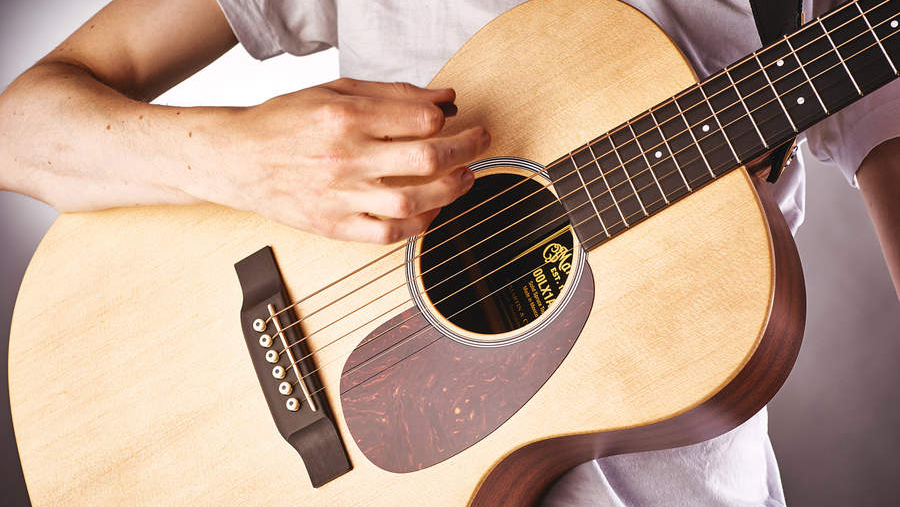
☑️ A global audience of 3.8 million guitarists monthly
☑️ 1,200+ reviews on GuitarWorld.com
☑️ 30+ years of product testing at Guitar World
Guitar World boasts over 44 years of expertise and stands as the ultimate authority on all things related to guitars. The magazine and website feature expertly written gear round-ups and top-quality, authoritative reviews penned by a team of highly experienced industry professionals.
Guitar World's inaugural print issue hit the shelves in July 1980, and ever since, it has been captivating players and enthusiasts with engaging lessons, insightful interviews with the most prominent guitar heroes, and priceless buying advice for newbie players.
Below, you'll find more information on the expert authors of this guide.

Daryl is a Senior Deals Writer at Guitar World, where he creates and maintains our 200+ buyer's guides, finds the best deals on guitar products, and tests the latest gear. His reviews have been featured in prominent publications like Total Guitar, Future Music magazine, and MusicRadar.com.
During his career, he has been lucky enough to talk to many of his musical heroes, having interviewed Slash and members of Sum 41, Foo Fighters, Feeder, Thrice, and more. In a past life, he worked in music retail. For a little under a decade, he advised everyone from absolute beginners to seasoned pros on the right gear for their needs.

Chris Corfield is a journalist with over 12 years of experience writing for some of the music world's biggest brands including Orange Amplification, MusicRadar, Guitar World, Total Guitar and Dawsons Music. Chris loves getting nerdy about all aspects of guitar gear from electric and acoustic guitars to pedals, amps and more.

Matt is a Junior Deals Writer here at Guitar World. He regularly tests and reviews music gear with a focus on guitars, amps, pedals, modelers, and pretty much anything else guitar-related. Responsible for over 60 buying guides, a large part of his role is helping guitarists find the best deals on gear. Matt worked in music retail for 5 years at Dawsons Music and Northwest Guitars and has written for various music sites including MusicRadar, Guitar Player, Guitar.com, Ultimate Guitar, and Thomann’s t.blog.
A regularly gigging guitarist with over 20 years of experience playing live and writing and recording in bands, he's performed everything from jazz to djent, gigging all over the country in more dingy venues than you can shake a drop-tuned guitar at. When he's not holed up in his home studio recording new songs or tweaking pedal settings, you’ll find him making a racket with Northern noise hounds JACKALS.
How we test acoustic guitars
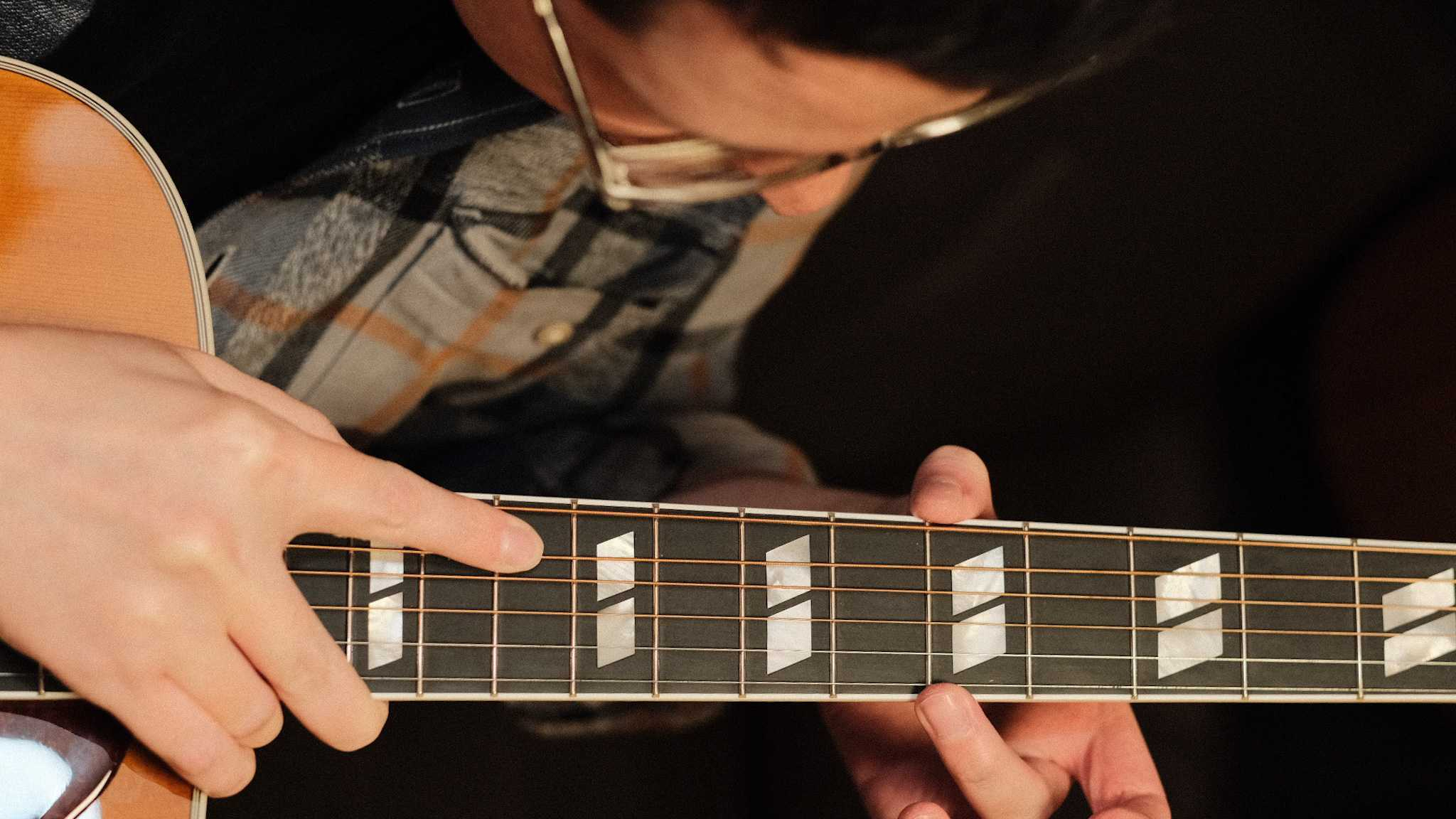
When it comes to acoustic guitars, every player's unique personal preferences regarding the tone and feel are of utmost importance. This individuality is a key factor in the joy of playing and should be celebrated. However, there are a few key criteria that an acoustic guitar must meet, regardless of personal taste, before we'd feel comfortable recommending it.
When we receive a guitar for review, we start by asking ourselves the following questions:
- How easy is the guitar to play?
- Does the guitar sound good?
- Is this model well-made and robust?
- And does the guitar offer the player good value for money?
Below you'll find a breakdown of the tests we carry out to answer each of these questions.
Build quality: Like with all instruments, we first examine the overall build quality. We closely inspect every inch of the guitar, from the body and neck to the machine heads, bridge, and saddle, to ensure it feels robust and sturdy and ready to take you on your musical journey.
Playability: We'll next check the consistency of the fretwork to confirm there aren't any sharp frets or uneven frets that may result in buzzing. This ties into the guitar's playability. For us, the guitar should be comfortable for someone completely new to the instrument, and this means a reasonably forgiving neck and unobtrusive body.
Sound: Next, we turn our attention to the sound of the acoustic guitar. To test the tone of the instrument, we will try a variety of different playing techniques and styles to see how the guitar handles them. For instance, we'll strum wide-open chords with a flat pick to test the guitar's projection and clarity, and then we'll do some soft fingerpicking to assess its warmth and resonance. We are carefully listening to the volume the guitar produces and the overall tonal balance of the sound.
Value: Lastly, we'll carefully combine our thoughts on all the above sections – from design and performance to sound – and weigh them against the acoustic guitar's price. We understand that finding the perfect balance between quality and affordability is key to choosing the right acoustic guitar for your needs. We strive to ensure that you get the best value for your investment.
Find out more about how we make our recommendations and how we test at Guitar World.
How we shoot product demos
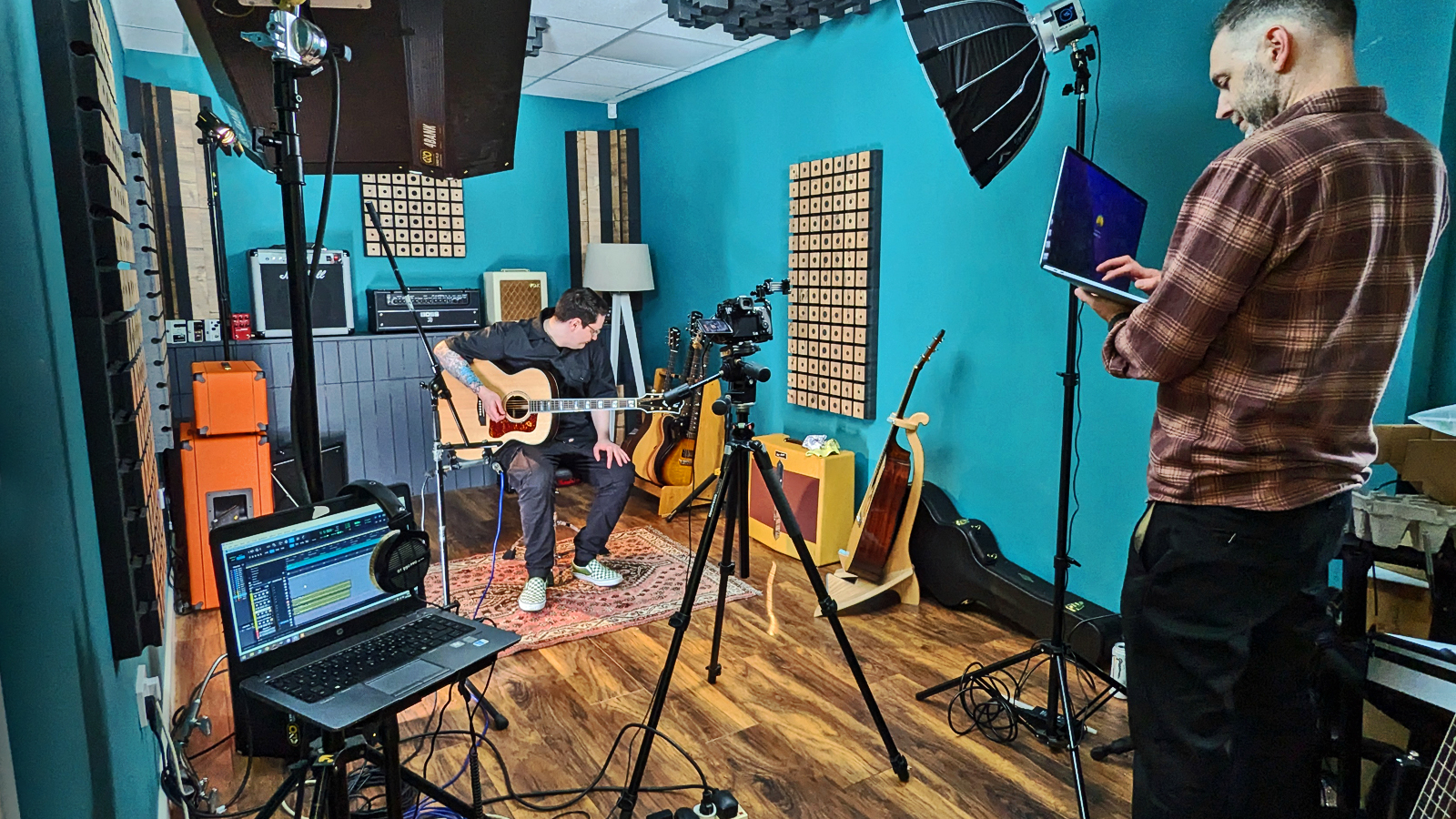
One of the most significant factors to consider when choosing an acoustic guitar is the sound it produces – that’s why I've recorded and filmed a short playing demo of every guitar in the guide. That way, you can make an informed decision based purely on which model you think sounds the best.
In order to keep things simple, I performed the same chord progression on every guitar at three dynamic playing levels. First, I strummed the guitar with a plectrum to show off the instrument's volume range. Next, each note was picked individually to display the guitar's note clarity. Lastly, I ditched the pick and used my fingers to see how the guitar reacted to the subtle nuances of fingerpicking.
The team and I recorded the video demos in our dedicated studio in Bath, UK. If you’re a regular consumer of guitar content on YouTube, you may recognize this space as the famous Guitarist Tone Lounge.
Now, to ensure the most natural tone possible, we used a simple crossed microphone technique – known as the X-Y technique – to capture the exact sound in the room. We used a pair of Austrian Audio CC8 condenser mics for this. In my opinion, this humble stereo microphone set-up typically produces the most true-to-life sound, perfect for hearing the guitar as you would if you were the one playing it.
As you’d expect, we did apply some post-processing to the audio once it was captured, but we kept this to a minimum. A little compression was applied to help keep the volume levels consistent throughout the demos, and EQ was used to cut “boomy” frequencies that built up in the room. Lastly, we added a touch of digital reverb to add a sense of depth to the recording.
Recent updates
02/02/26: We've updated the intro with more information about the author and added more detail to our glossary of acoustic guitar terms. 23/10/25: This page has been fully audited to ensure we are satisfied with the current selection of models, and we've also refreshed the images used throughout the guide. 28/02/25: We have completely overhauled this page, adding demo videos for each guitar, new photos, more in-depth information and clarity to our buying advice section as well as new star ratings.
26/06/24: We've assessed and streamlined our product choices to make it much easier to find the right guitar for your needs. We've also added more clarity and depth to our buying advice and testing methodology.
Related buyer's guides
You can trust Guitar World
- Downsize to one of the best 3/4 acoustic guitars
- On a budget? These are the best acoustic guitars under $500
- The best classical guitars: nylon-string guitars for every budget
- Unplug and play with the best acoustic bass guitars
- Just starting out? Check out the best beginner classical guitars
All the latest guitar news, interviews, lessons, reviews, deals and more, direct to your inbox!

Daryl is a Senior Deals Writer at Guitar World, where he creates and maintains our 200+ buyer's guides, finds the best deals on guitar products, and tests the latest gear. His reviews have been featured in prominent publications like Total Guitar, Guitarist, Future Music magazine, and MusicRadar.com.
During his career, he has been lucky enough to talk to many of his musical heroes, having interviewed Slash and members of Sum 41, Foo Fighters, The Offspring, Thrice, and more. In a past life, Daryl worked in music retail. For a little under a decade, he advised everyone from absolute beginners to seasoned pros on the right gear for their needs.
Daryl is a fully qualified sound engineer, holding a first-class Bachelor's degree in Creative Sound Production from the University of Abertay.
- Chris Corfield
- Matt McCrackenJunior Deals Writer









